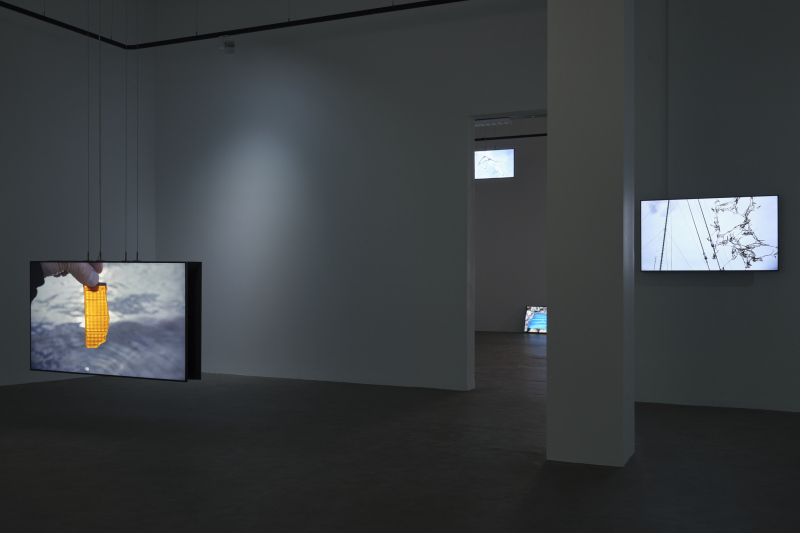
Re_sett_ing_s, JAKI IRVINE & LOCKY MORRIS 2023. Void Gallery Derry. Photo Simon Mills
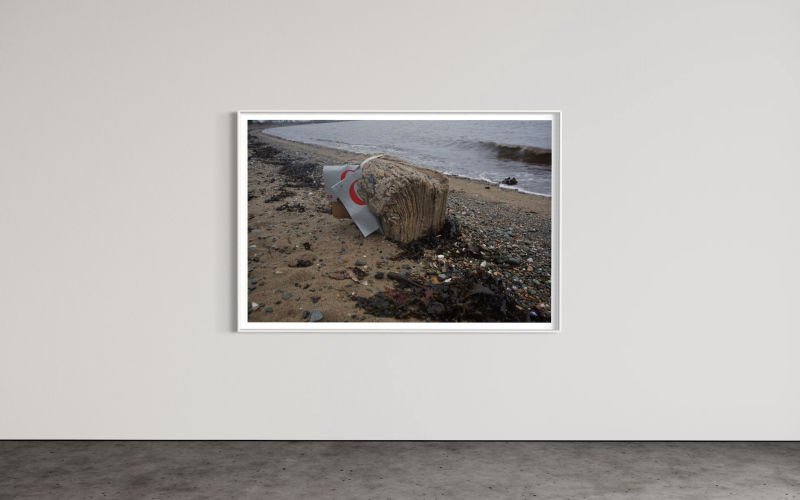
Red Cs,
Locky Morris
2023.
Photograph
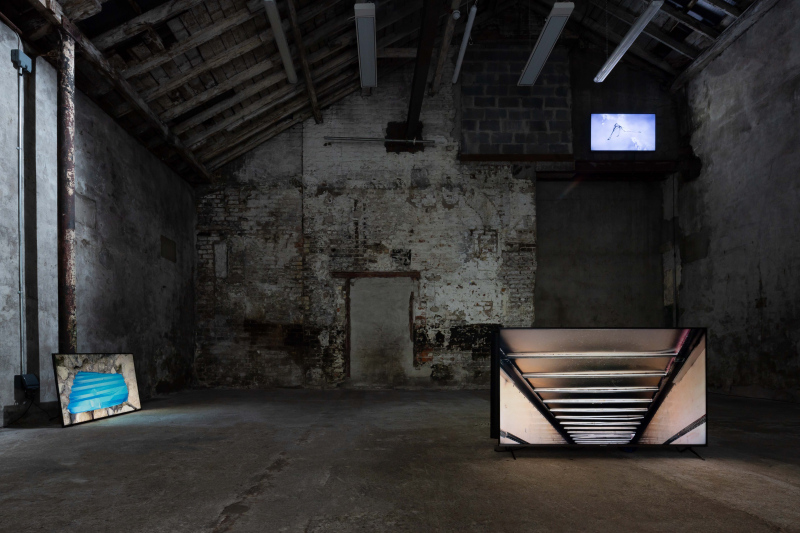
Re_sett_ing_s, JAKI IRVINE & LOCKY MORRIS 2022. Complex Gallery Dublin. Photo Kate-Bowe O' Brien
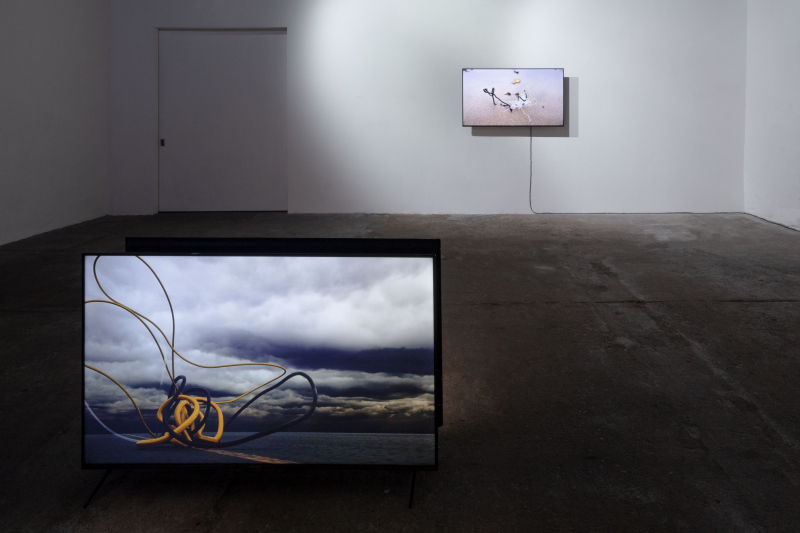
Re_sett_ing_s, JAKI IRVINE & LOCKY MORRIS 2022. Complex Gallery Dublin. Photo Kate-Bowe O' Brien
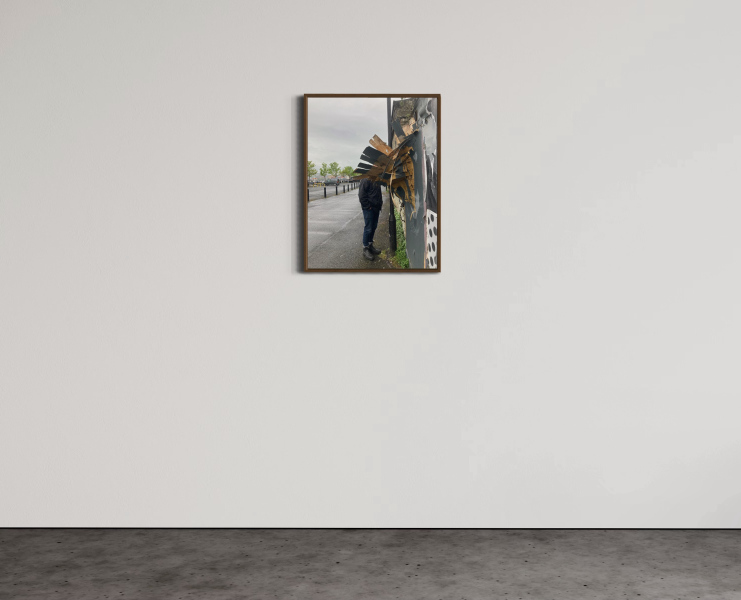
Selfie,
Locky Morris
2022
Photograph
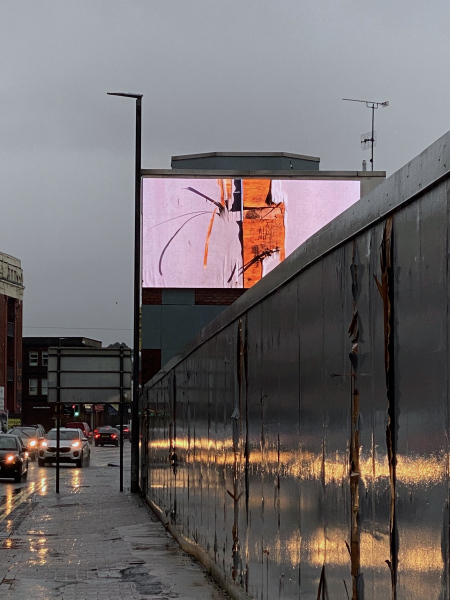
Outside Job, (2021)LED Digital Billboard. Billboard Project, Void Offsites, April 2021
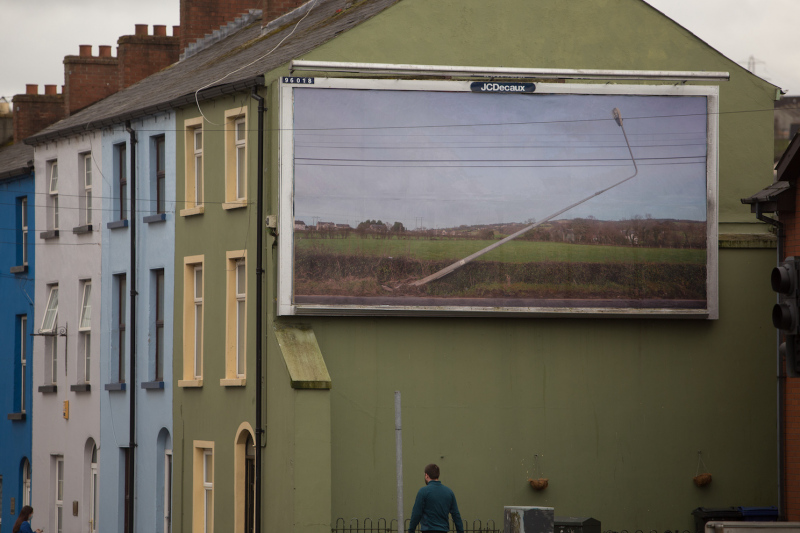
No. 8, (2021) Billboard Project, Void Offsites, Photo by Harry Kerr, courtesy of Void Gallery
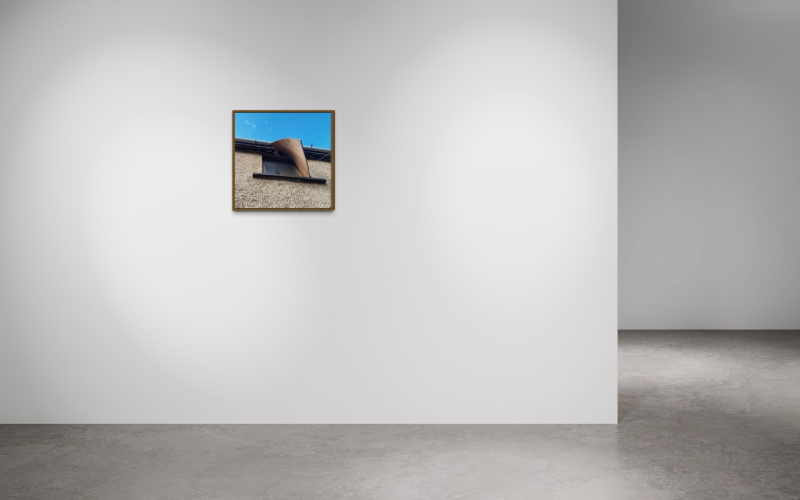
Peel back,
Locky Morris
2021
Photograph
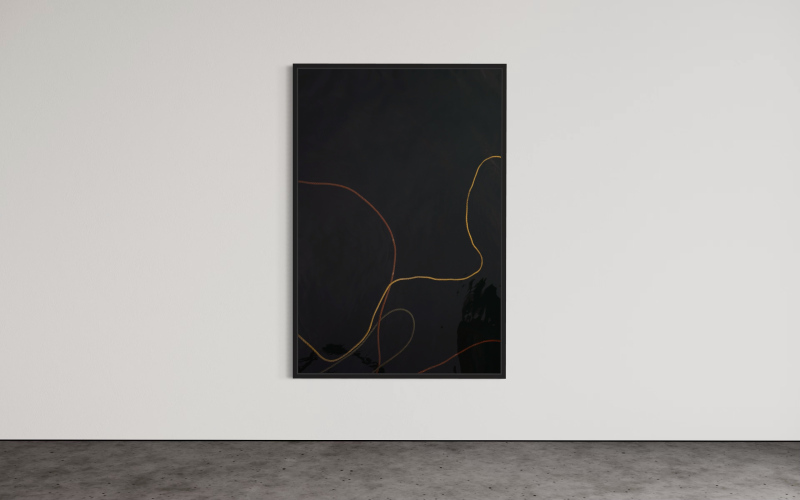
Floaters,
Locky Morris
2021
Photograph
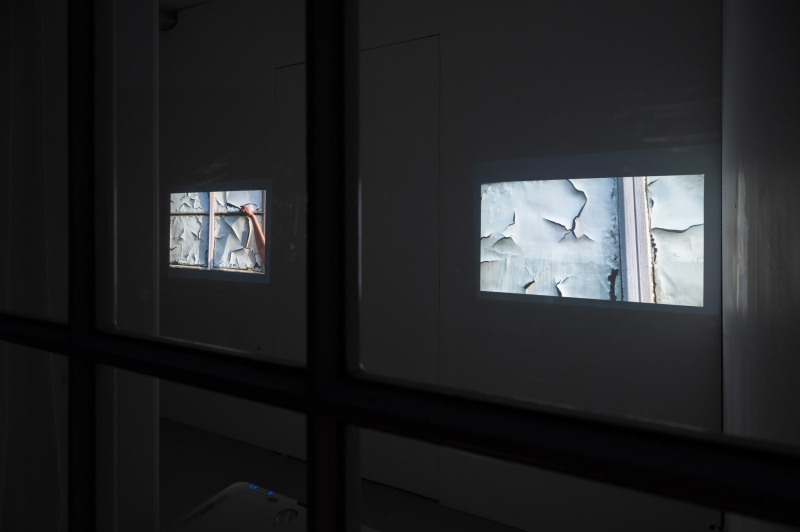
nothing (but windows) (2021) Janie Doherty, Locky Morris Commissioned by Centre for Contemporary Art, Derry
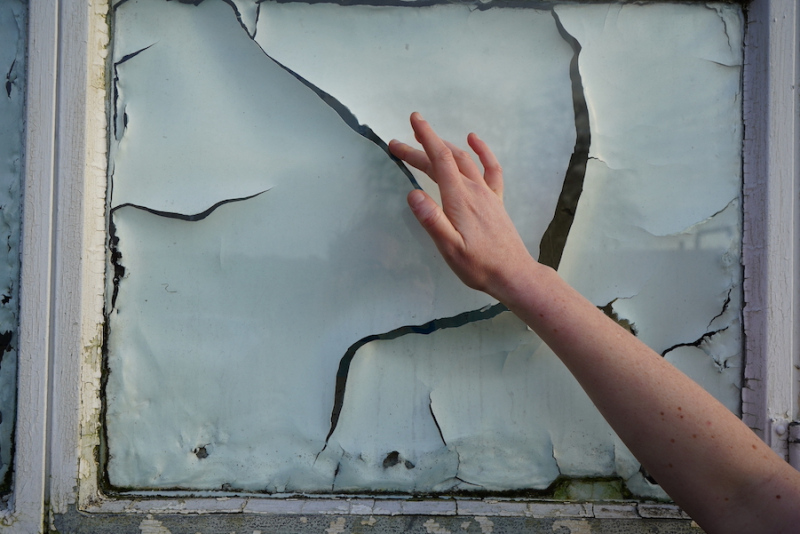
nothing (but windows) (2021) video still. Janie Doherty, Locky Morris. Centre for Contemporary Art, Derry.
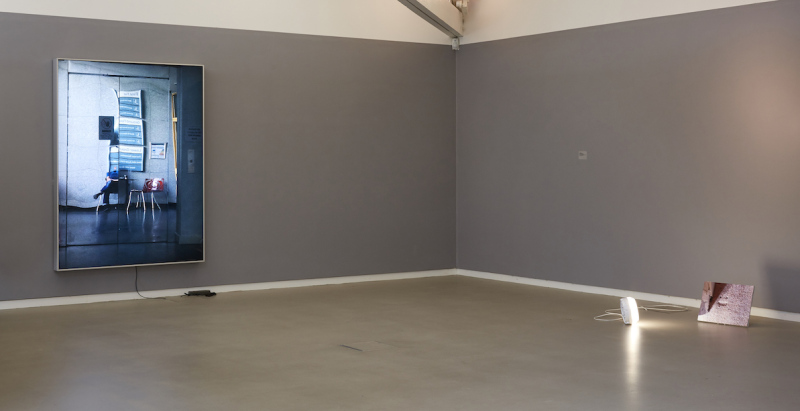
Locky Morris (2019) Install image. La tête disparaît/stairlift emoji
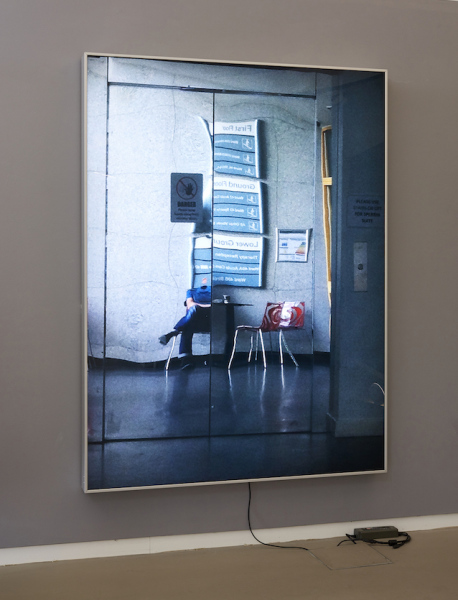
La tête disparaît (2019)
1300 x 1650 x 100mm. LED lightbox, Duratran. Collection National Gallery of Ireland
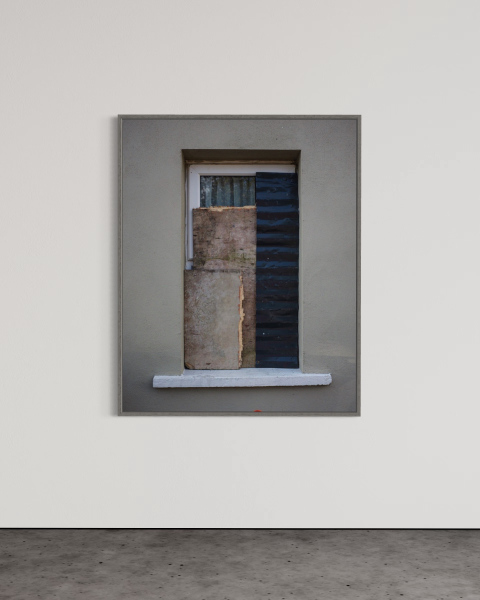
Windowcomplaint,
Locky Morris
2019.
Photograph
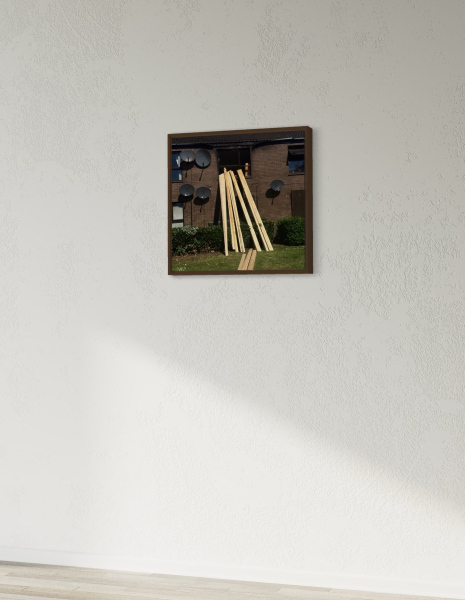
Fourbytwos,
Locky Morris
2019.
Photograph
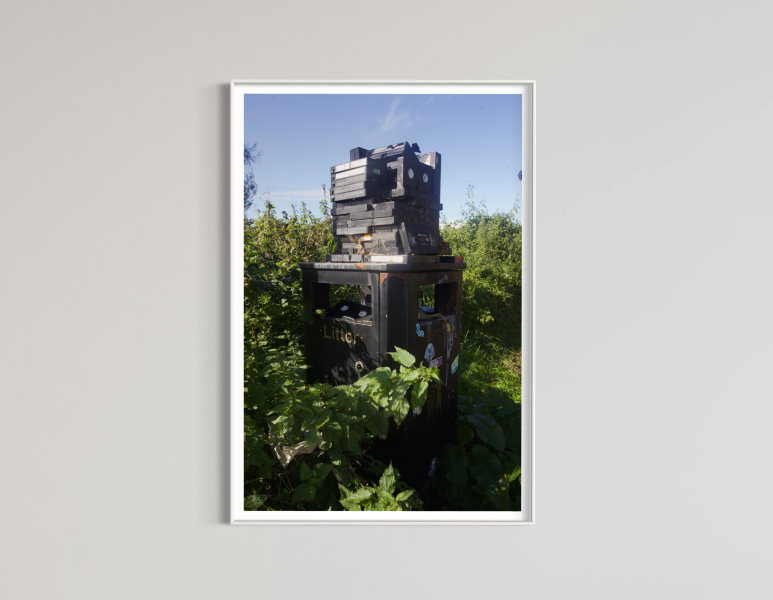
Vhs'
Locky Morris
2018,
Photograph
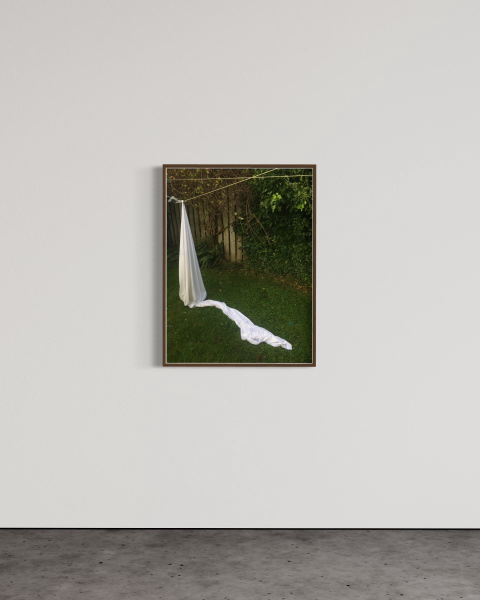
Manys an afternoon,
Locky Morris
2018,
Photograph
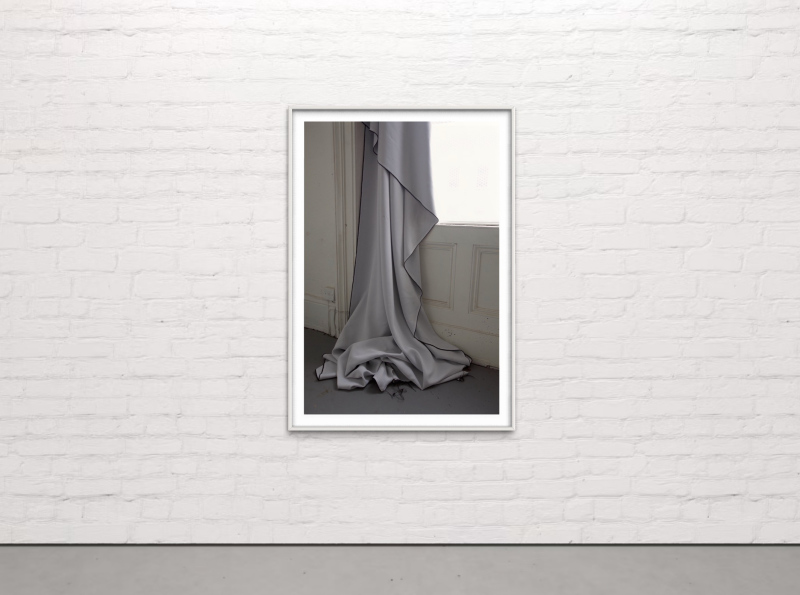
Studio curtain (2018) 812 x 1320mm.
C-type print.
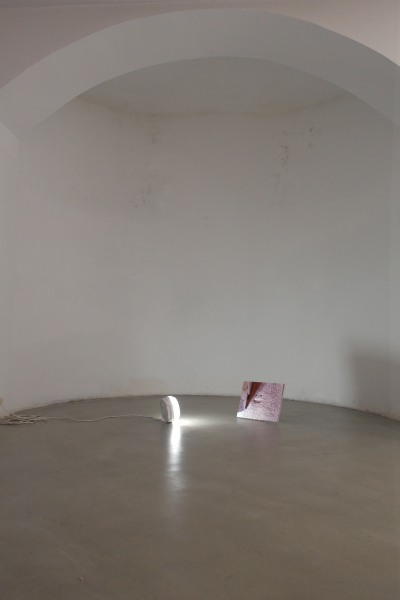
Stairlift emoji (2017) (installation image
"The Effects of Crossings & Self-Aggrandization in the Human Kingdom" Mario Mauroner Contemporary Art Vienna 2020
variable dimensions.
Artist mounted photograph on plasterboard, plate-stand, bulkhead light, cable.
'... The Irish artist sets out with his camera or smartphone in order to record found situations, momentary sculptures, and readymades from everyday life. Yet that is just one part of his work, which can boast a rich array of videos, installations and three-dimensional works.
His small installation Stairlift Emoji from 2017 shows the impression left by the mountings for a stairlift in his mothers house. She succumbed to dementia and as the stairlift was removed a kind of Smiley could be seen on the stair carpet. It is above all these small things, which normally go unnoticed, that interest the artist. Things that can have an appreciable effect in day-to-day life, whether as a commentary on a specific occurrence or quite simply as an impulse that stretches our minds in new directions...' (text extract from Be Seeing You, Martin Stather, Mannheimer Kunstverein, Catalogue 2020)
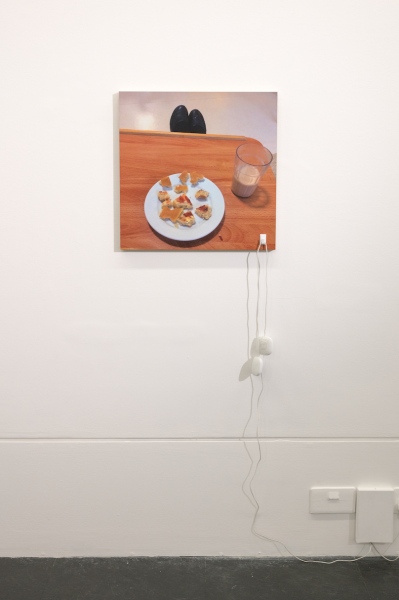
It’s you it’s you it’s you (2017) variable dimensions (image 500 x 500 x 70mm)
C-type print mounted on 18mm ply, sleep therapy pillow speakers, self-adhesive plastic hook (white) Audio
'...In another such interactive work a pair of small sleep therapy pillow speakers play a rendition recorded on a mobile phone of an Irish country easy listening song made famous by Joe Dolan; It's You It's You, It’s You, (the title of the work). Wires belonging to the speakers hang over a self-adhesive plastic hook attached to a photograph depicting an image of a tray with uneaten pancake and a glass of tea belonging to two small neatly clad feet in black shoes protruding from the far edge...'
(text extract from Especiallyeverything: the practices of Locky Morris, Anne Tallentire, Once a day every day all day long, Locky Morris 2019)
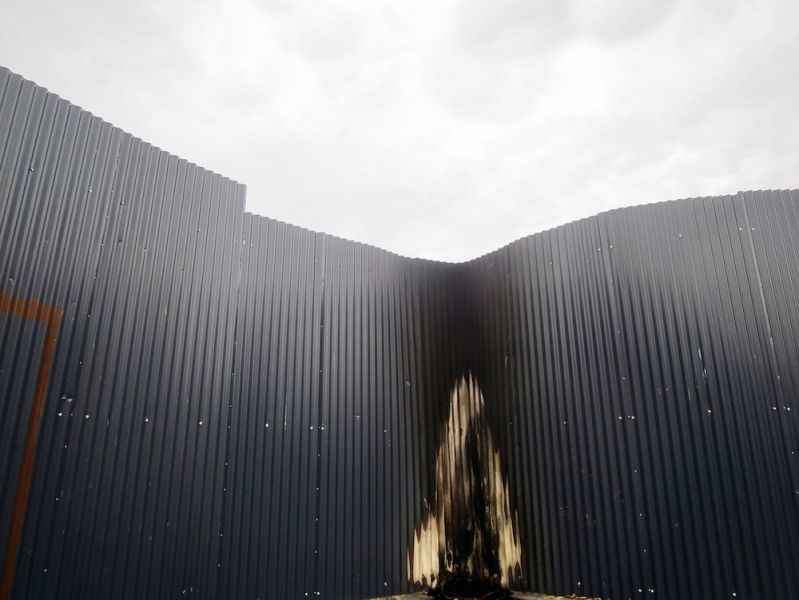
Tyre Fire (2017) 2100mm x 1550mm. LED lightbox, Duratran transparency
'Morris became known for his early sculptural work, which commented on “The Troubles” in Northern Ireland in the 1980’s. At the time, much of his work repurposed everyday objects and materials to create narratives about the negative effects of sectarian violence and government security measures on peoples lives.
Subsequently his work has become more personal and idiosyncratic. Often he begins with photography, which then gets incorporated into sculptural installations where objects formally or symbolically relate to the photograph(s) in associative ways. Connections are not always obvious, but rather cryptic puzzles are created for the viewer to solve.
Morris’s works poetically trigger the imagination rather than providing specific interpretation. There is a mischievousness in his strategy, as Morris imbues everyday and mundane images and objects with mysterious or portentous meaning. Manipulating materials in surprising ways, he produces objects that at first seem ordinary but gain importance as complex narratives unfold to the viewer.
The large Duratran image in this installation was recently shot in Derry, Northern Ireland, early in the morning while taking his children to school. On learning that he would be exhibiting at 1414 Monterey Street in a room with a fireplace, Morris remembered the image of the scorched corrugated iron wall in Derry. In the current political climate, this wall in Derry is redolent of the proposed wall along the Mexican/United States border, and similar divisive structures in other parts of the world' (wall text, Mattress Factory Museum, Pittsburgh 2017, ‘So it is’ curated by John Carson)
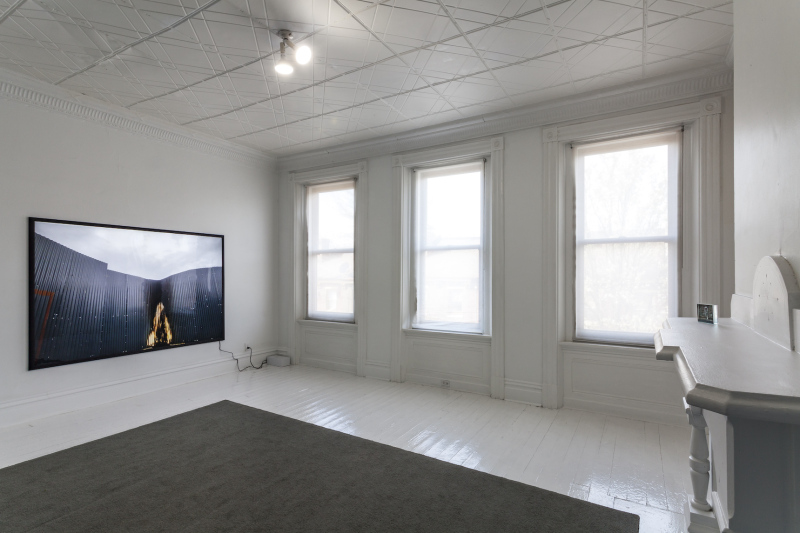
Tyre Fire (2017) 2100mm x 1550mm. LED lightbox, Duratran transparency, P, (2017) Photograph, glass block frame (2017) 152.4 x 101.6 x 25.4 mm (view Mattress Factory Art Museum, Pittsburgh USA)
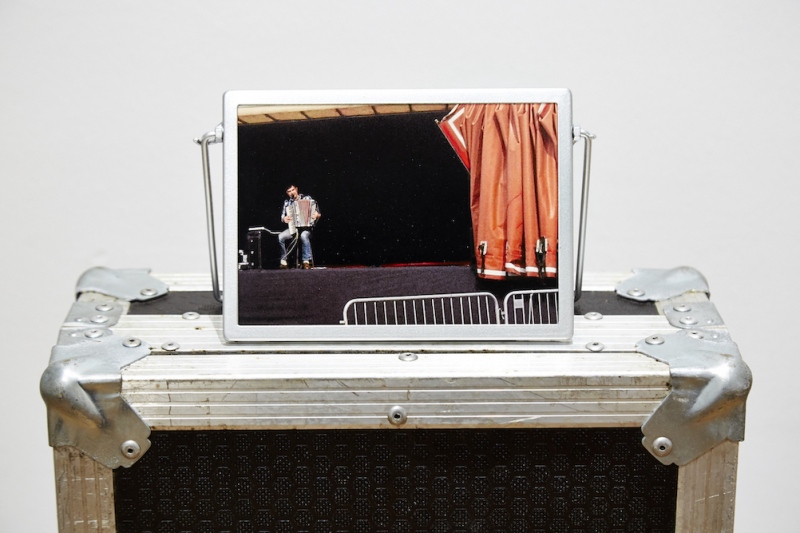
Opening Act (2016) 980 x 180 x 460mm.
C-type print, artists’ keyboard flight case, readymade frame
'...Dissolving boundaries between convention and experimentation extends to titles and captions that with rhetorical flourish draw further meaning. Opening Act (2016), a photograph in a readymade frame resting on top of a keyboard flight case suggests the beginning and end of performance narrative continually on the move;...' (text extract from Especiallyeverything: the practices of Locky Morris, Anne Tallentire, Once a day every day all day long, Locky Morris 2019)
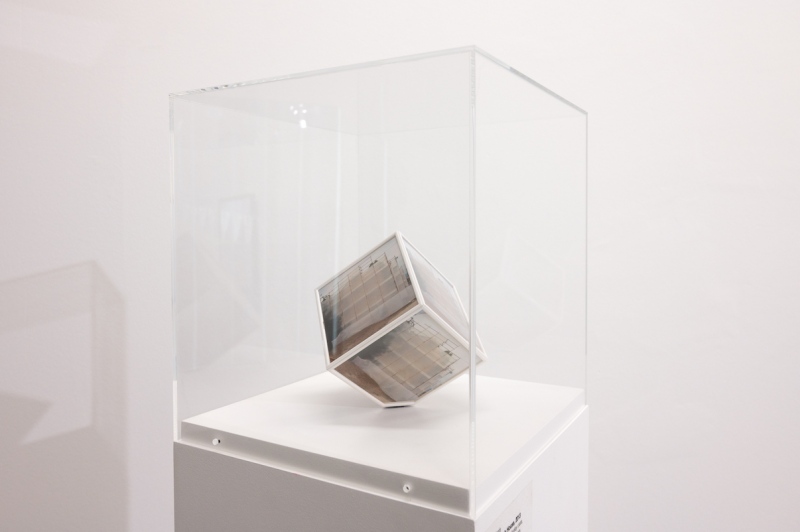
Michelangelo’s House (2013) 300 x 300 x 1200mm.
Painted MDF pedestal display case, rotating photo cube, C-type prints
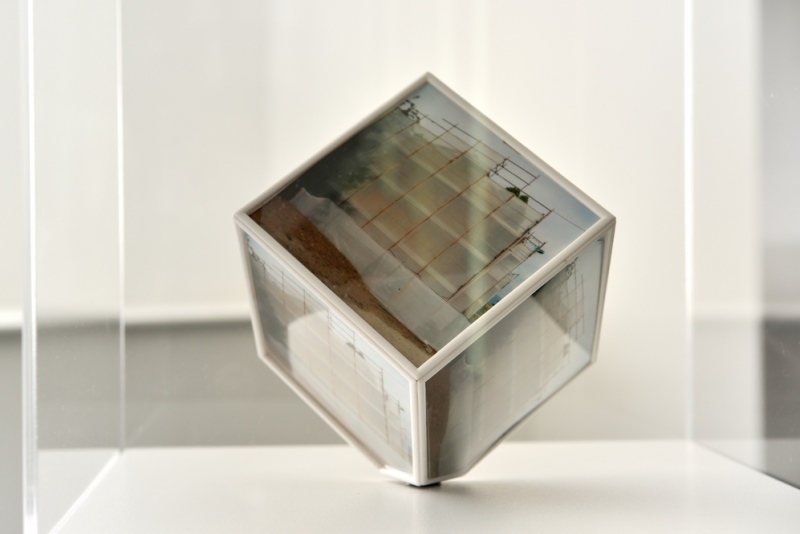
Michelangelo’s House (2013) 300 x 300 x 1200mm.
Painted MDF pedestal display case, rotating photo cube, C-type prints
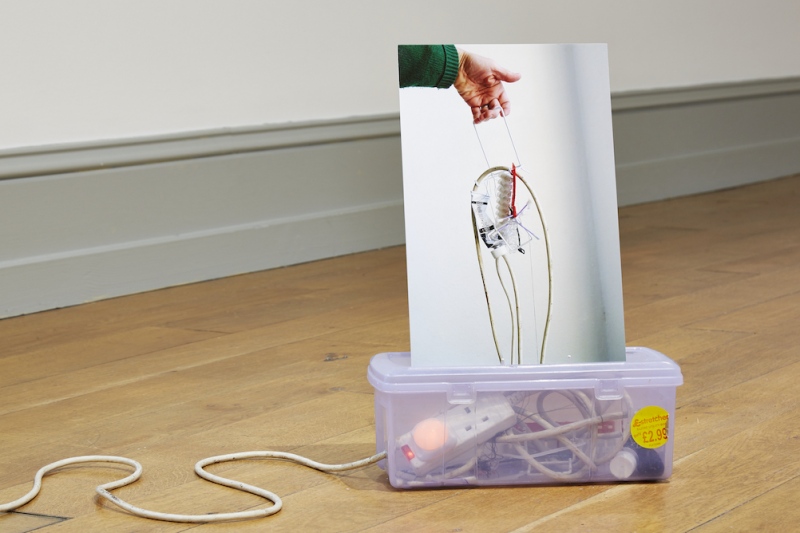
First Thing (2012)
variable dimensions. A4 mounted photograph, plate stand, 5 litre £stretcher utility box, spool of thread, plastic strips for wall plugs, wall plugs, cable ties, small plate stand, 4 gang extension lead, night light (mini plug-in), cotton buds, acrylic paint tube, connector strips, decorating clips
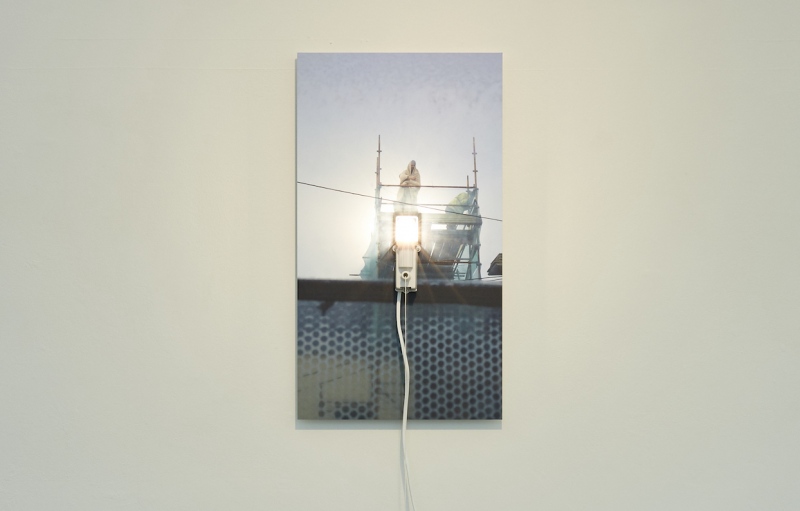
On High (2011) (detail) 30.3 x 53.6 x 6 cm. Lambda print on aluminium plate, pigmy light
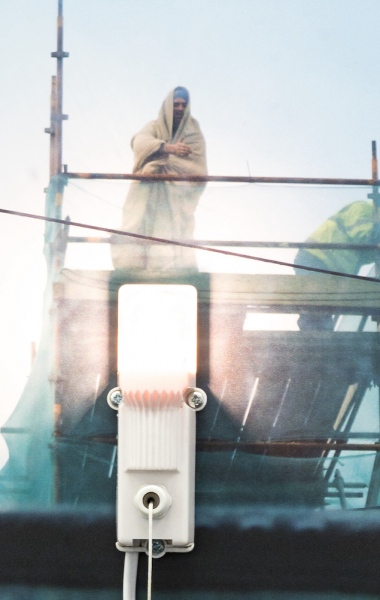
On High (2011) (detail) 30.3 x 53.6 x 6 cm. Lambda print on aluminium plate, pigmy light
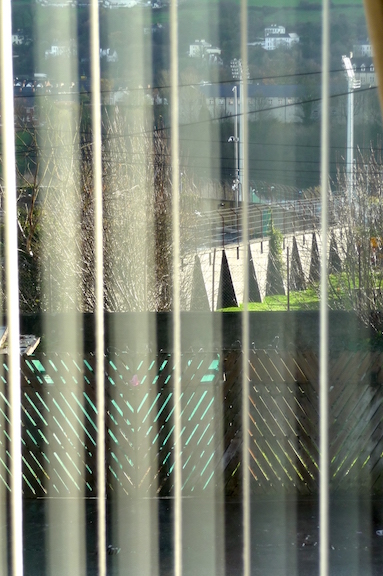
Day of the Rat (2010) 1800 x 1200 x 40mm.
Ultra slim LED lightbox, Duratran
'...In Day of the Rat, a photographic image presents the view through the blinds of a window, overlooking an imposing concrete bunker. At a formal level, one notes the voyeuristic arrangement of the scene, the artist's gaze from the periphery, from the inside of the house, onto the landscape. The anecdotal subtext adds another layer, however, re-visiting the political history of Northern Ireland from a contemporary, post-Troubles perspective. Morris had been asked to sort out a dead rat, decomposing underneath the floorboards of his mother's house. Having called in professional exterminators, who were engaged in cutting holes in the floor while trying to 'sniff out' the corpse, the artist and his family retreated to the upstairs bedroom. Here, his eye was caught by the glare of sunlight through the window and a glimpse through the shutters of a cemetery outside. For Morris, the building's stark exterior, brutalist architecture and nearby floodlights recalled a prison camp and it is this (un) intentional misreading that can be seen to bridge the two divides of his practice. The correspondence between cemetery and floorboards, the artist sequestered in his mother's bedroom while 'interpreting' the building as a prison, the uncanny charge of the past rushing into the present; through these accidents, one infers the legacy of the Troubles. It is Morris' attunement to such connections, and his ability to re-assemble and re-create that experience, that offers another, subtler reading. It is this anecdote that resists the overall, objective meaning and that states, without apology: “I guess you had to be there.” (text extract ‘Practicing everyday life’ Chris Clarke, This Then, Locky Morris, Catalogue 2010 )
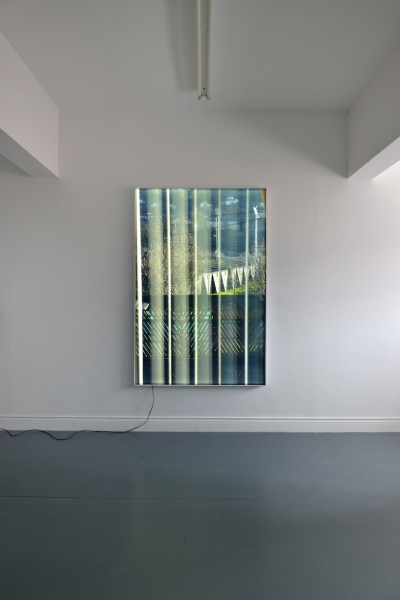
Day of the Rat (2010) 1800 x 1200 x 40mm.
Ultra slim LED lightbox, Duratran
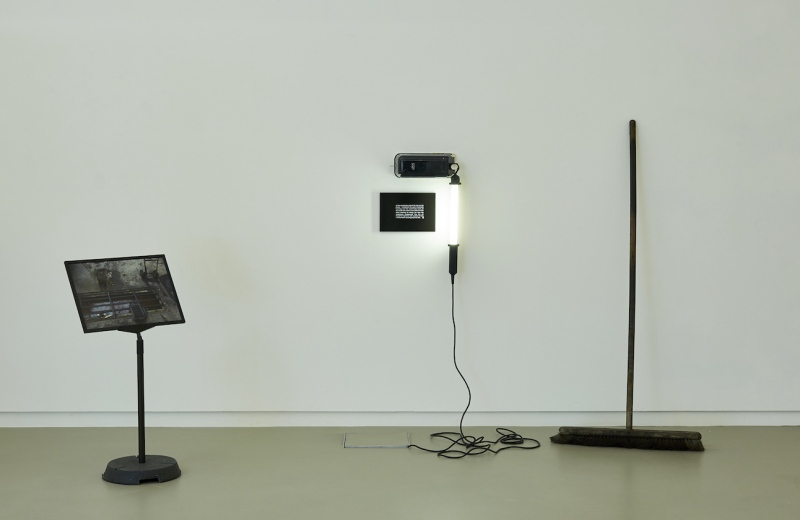
The Drop 2007 (reconfigured 2016) variable dimensions.
Mounted photographs, shorty tilt display stand, Smartlamp, hand cleanser dispenser, sunglasses, workshop broom
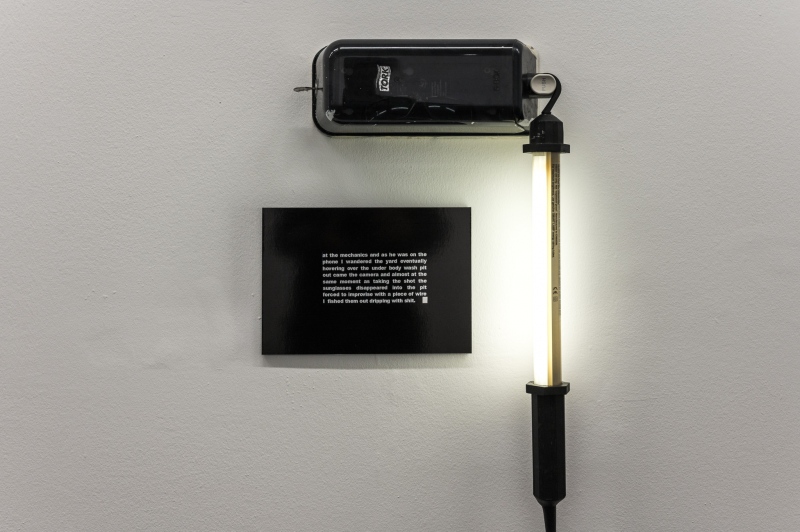
The Drop (detail) (2007 reconfigured 2016) variable dimensions.
Mounted photographs, shorty tilt display stand, Smartlamp, hand cleanser dispenser, sunglasses, workshop broom
'...Locky Morris’s The Drop tells a story, but it also makes us act out a sort of double-take, running between the different parts of the installation to piece together and relive the moment when – plop/click – the glasses disappeared into that trough of filth, and the camera simultaneously captured the scene. It’s an impossible, comic moment, but also one where you shake your head and think, ‘Isn’t it always the way?’. Like most of Morris’s work, The Drop springs from photography to entangle us in that brief incident. He explores the mundane, and picks at the seemingly insignificant to bring out the humour and the deeper paradoxes in those moments, the forgotten fascinating corners in the day’s repetitive chores...'
(text extract from Ridiculous Beginnings, Chris Fite-Wassilak for Stop lookin' at Photographs!, Locky Morris, Naughton Gallery, Belfast (2017)
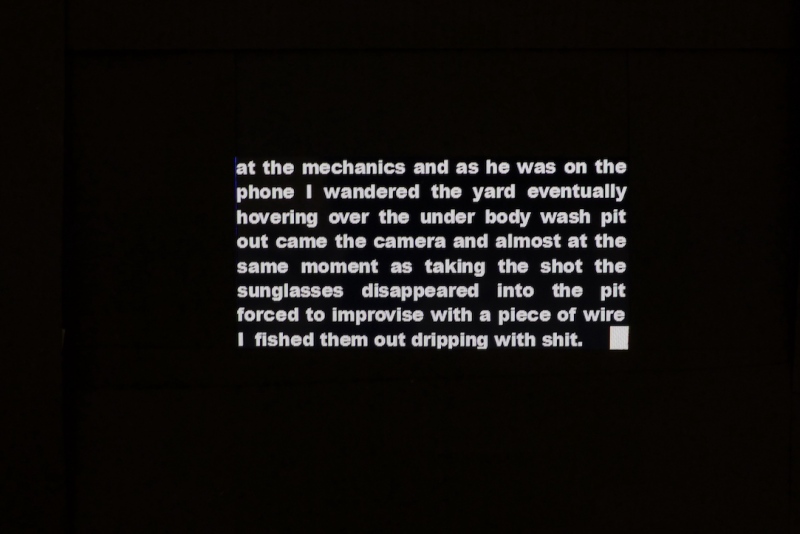
The Drop (detail) (2007) reconfigured 2016) variable dimensions.
Mounted photographs, shorty tilt display stand, Smartlamp, hand cleanser dispenser, sunglasses, workshop broom
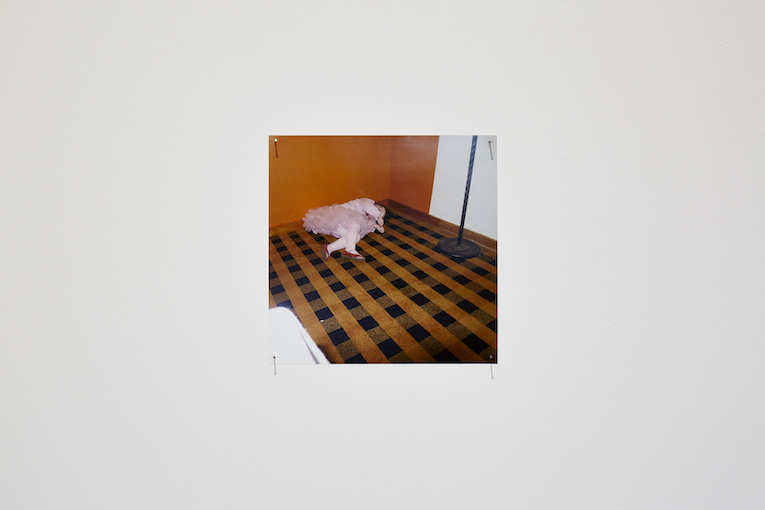
Downtime (2011) 253 x 253mm.
C-type print
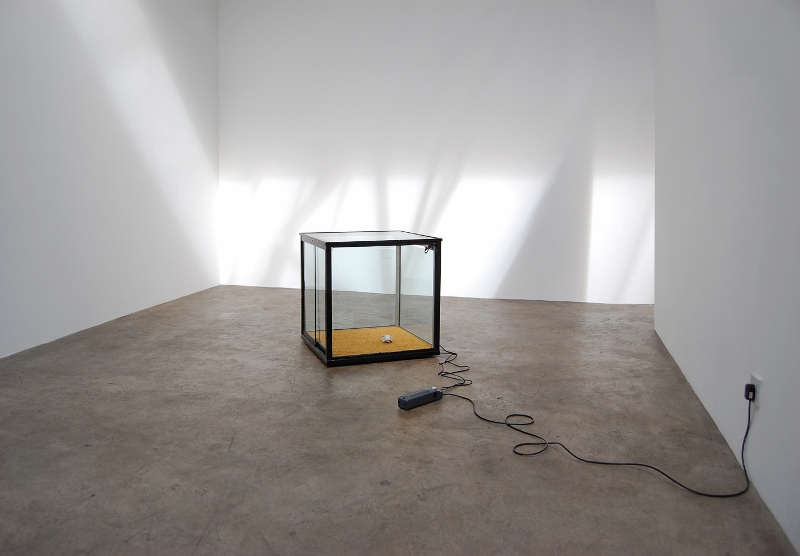
From Day One (2008) variable dimensions, approx. 63.5 x 63.5 x 68 cm. illuminated glass display case, carpet, crumpled card (child's shirt collar insert)
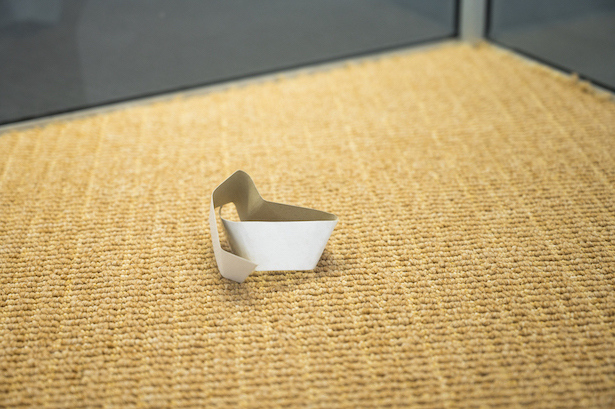
From Day One (detail) (2008) variable dimensions, approx. 63.5 x 63.5 x 68 cm. illuminated glass display case, carpet, crumpled card (child's shirt collar insert)
'...In Morris' recent works, it seems as if he is trying to establish the border between humanity and the appearance of humanity. To record the act of living, of seeing, of hearing, and being in the world. As in 'From Day One', where Morris installs a square section of his bedroom carpet into a glass vitrine, onto which his daughter, in the chaos and excitement of her first day at school, has tossed a tiny cardboard collar support. It is a moment of uncoiled human promise captured along with the priceless visualisation of a bedroom missing
some carpet. And all this happens under the dullest of precincts, the fluorescent glare of a bulb - the last place one would stumble upon an act of paternal love...' (text extract John M. Cunningham, This then, Locky Morris. Catalogue 2010)
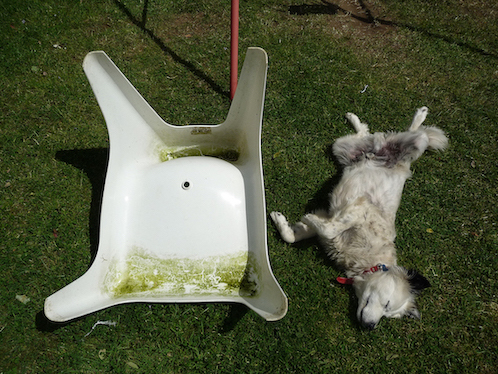
White Dog And Seat (2010) variable dimensions. C-type print
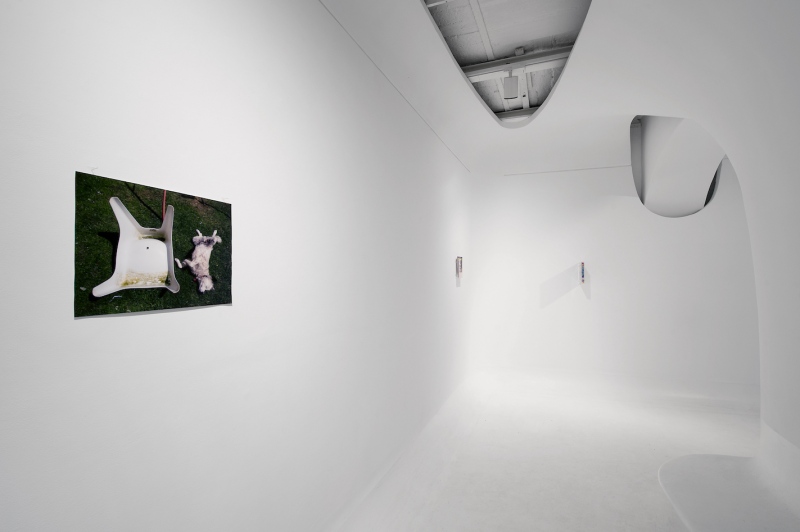
White Dog And Seat (2010) variable dimensions. C-type print (view Ex Elettrofonica, Rome, 2015)
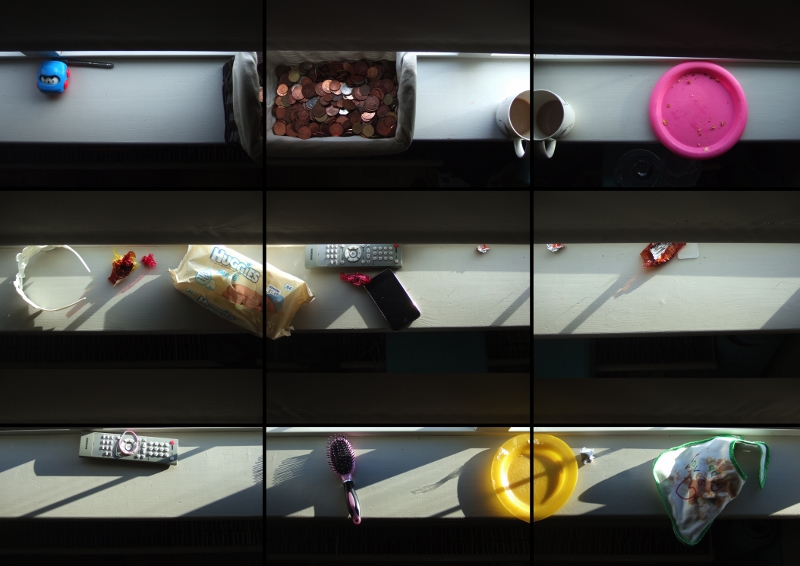
Windowsill (2008) (detail) variable dimensions. Duratrans, lightboxes.
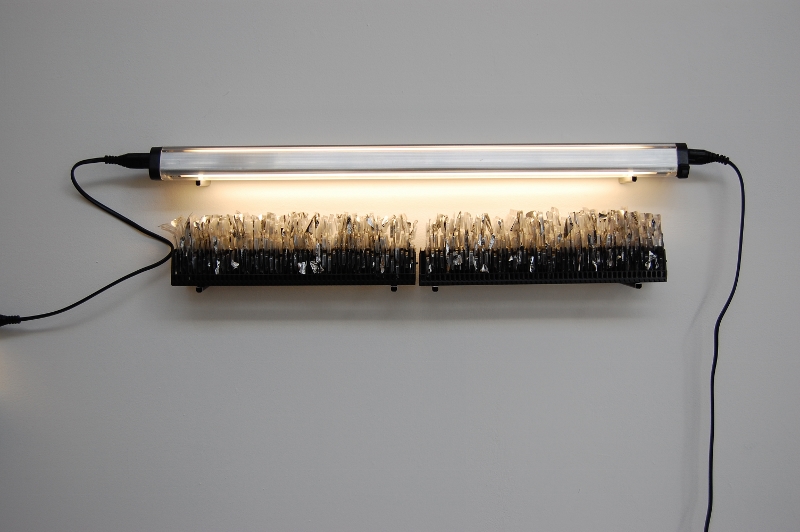
Acid Free (2007-2009) (detail) variable dimensions. Empty Rennie packaging (antacid medication) 35mm slide trays, wall lights, improvised brackets.
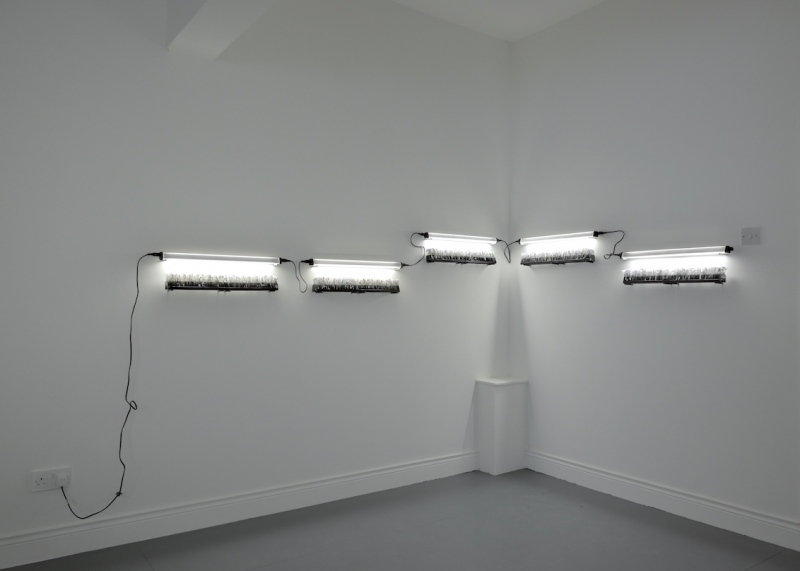
Acid Free (2007-2009) (detail) variable dimensions. Empty Rennie packaging (antacid medication) 35mm slide trays, wall lights, improvised brackets.
'... Similarly, in Acid Free, hundreds of tiny plastic packets of Morris' habitually taken anti-acid medication are assembled with the formal rigour, elegance and new-found dignity of a Dan Flavin installation...' (text extract From Day One, Locky Morris, mother's tankstation, Dublin 2010)
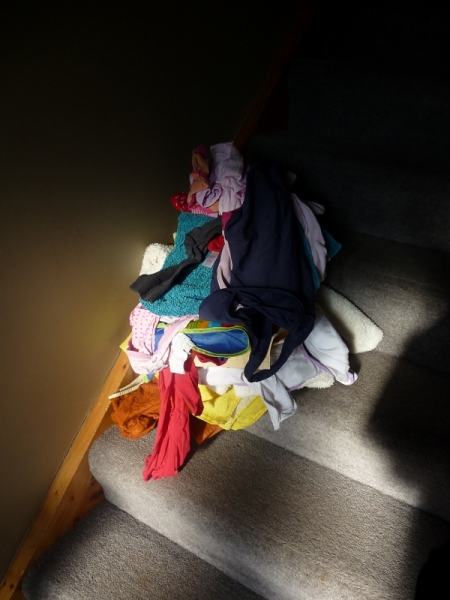
Stairpile (2008) variable dimensions. C-type print
'...With evident delight and humour Morris magnifies seemingly insignificant details of everyday life, piles of washing, cups of tea, chewed pencils - daily epiphanies, as he describes them - until they acquire the complexites and emotional profundity of an operatic aria. We laugh and cry at them and with them in equal measure. When the artist's intention reveals itself to the viewer - and it often tends to do so in a slow and deliberate manner...' (text extract From Day One, Locky Morris, mother's tankstation, Dublin 2010)
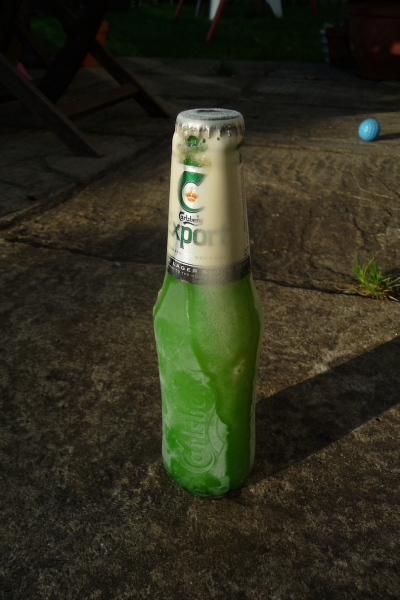
Frozen Export (2009-10) (detail) 24.5 x 38.1 cm. C-type prints
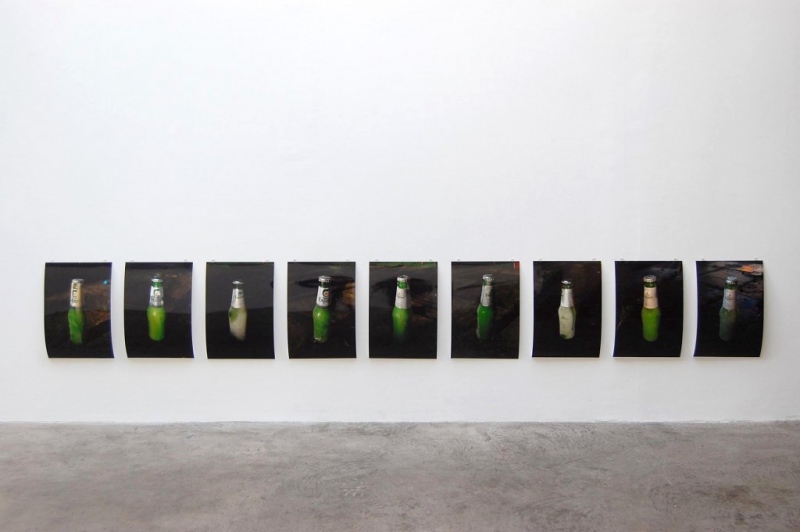
Frozen Export (2009-10) each 24.5 x 38.1 cm. 9 C-type prints

This Building (2010) variable dimensions (approx 50 x 150 x 145 cm) Upright piano elements, LP, framed photograph, powered speakers, CDR (looped audio)
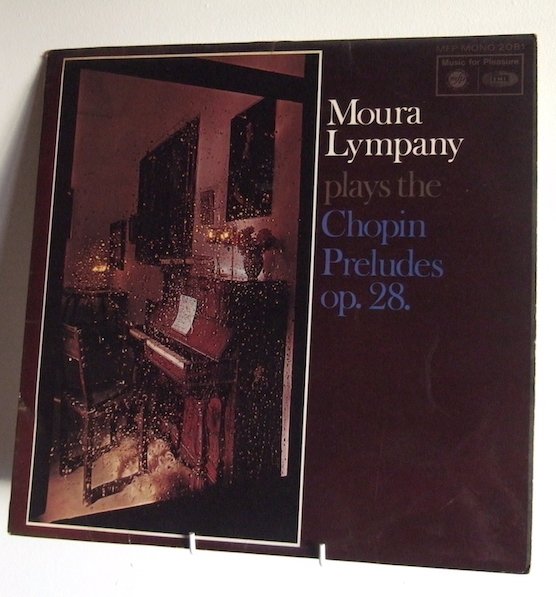
This Building (detail - Vinyl LP) (2010) variable dimensions (approx 50 x 150 x 145 cm) Upright piano elements, LP, framed photograph, powered speakers, CDR (looped audio)
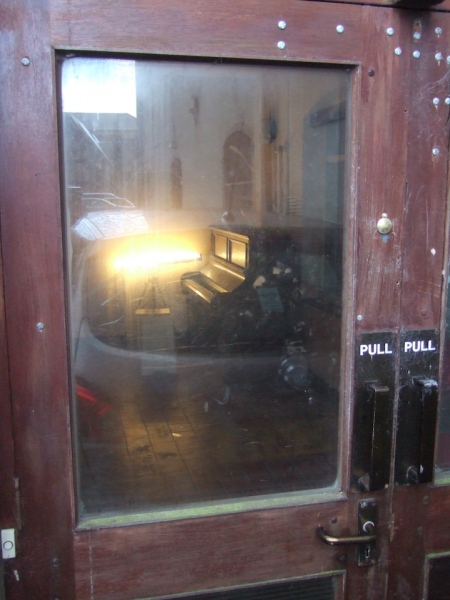
This Building (detail - framed photograph) (2010) variable dimensions (approx 50 x 150 x 145 cm) Upright piano elements, LP, framed photograph, powered speakers, CDR (looped audio)
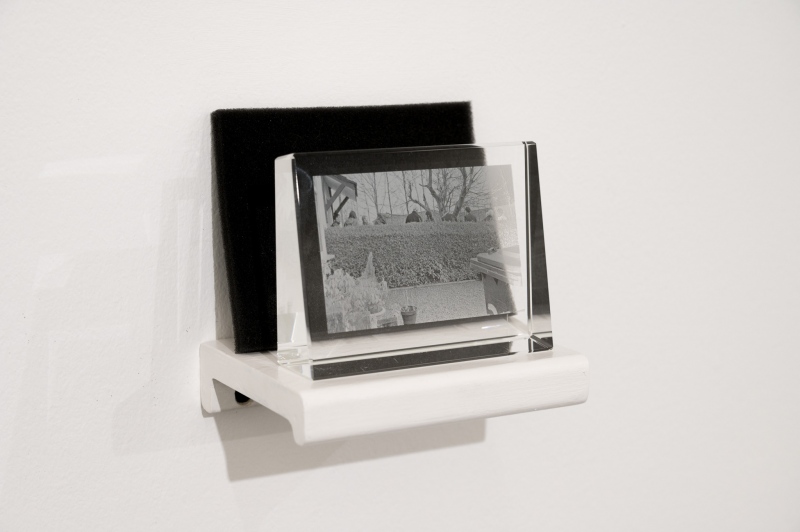
The Last (2010) 124 x 95 x 120mm. Laser crystal photo frame, foam lining, adapted shelf
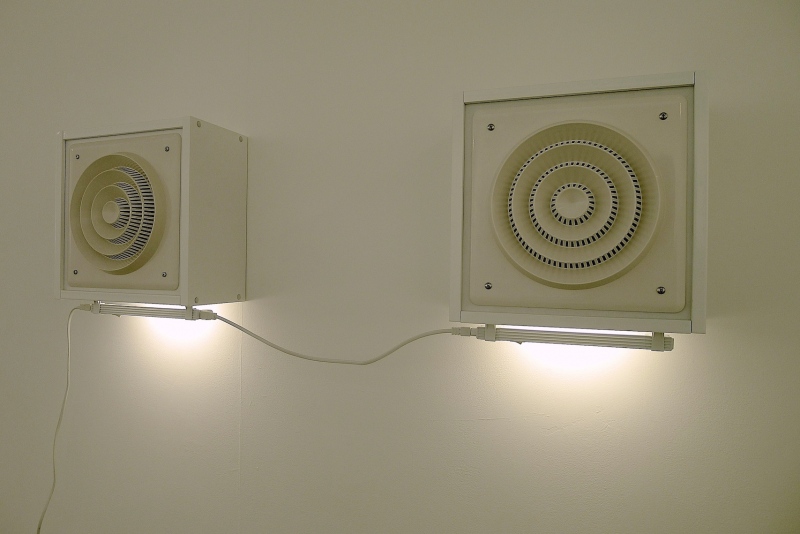
Bathroom Suite (2010) 164cmx153cmx18cm (variable) Adapted cubed shelving, linkable triphoshor flourescent fittings, ceiling speakers, audio. '...In Bathroom Suite, two discretely minimal speakers, reminiscent of fixtures in the artist's lavatory, play a composition based on Morris' morning routine. Constructed from recordings of the artist brushing his teeth, shaving, and pottering around the bathroom, the work is accelerated, distorted, mashed-up, spliced and compressed into a minute-long collage. Morris' fascination with found sounds is an extension of the artistic sensitivity to visual occurrences demonstrated in From Day One, yet also reveals his abiding interest in the transmission of such experiences.The tendency to conflate different periods of time and to render the initial source unrecognisable exemplifies the awareness that one cannot simply re-create that moment in its entirety, and that, in communicating the instant, it tends to become garbled, misheard, and incompletely represented...' (text extract ‘Practicing everyday life’ Chris Clarke, This Then, Locky Morris, Catalogue 2010 )
Bathroom Suite (2010) sound extract

Locky Morris
Teabreakdowns (2007 reconfigured 2016) (detail)
Printed mug, clock radio speaker, metal stand, A4 show-cards, artists’ studio table, audio loop
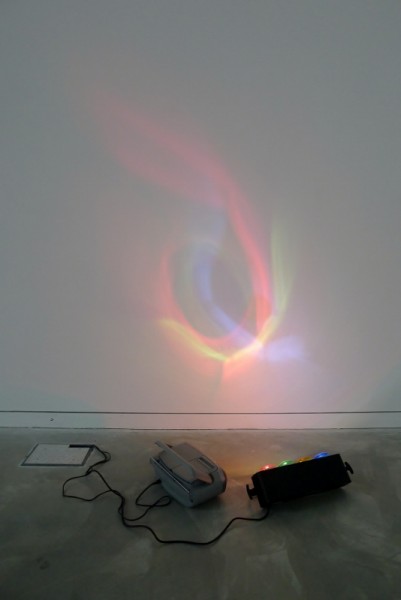
Home Entertainment (2006) variable dimensions. Sound activated disco lights, portable stereo, CDR (audio)
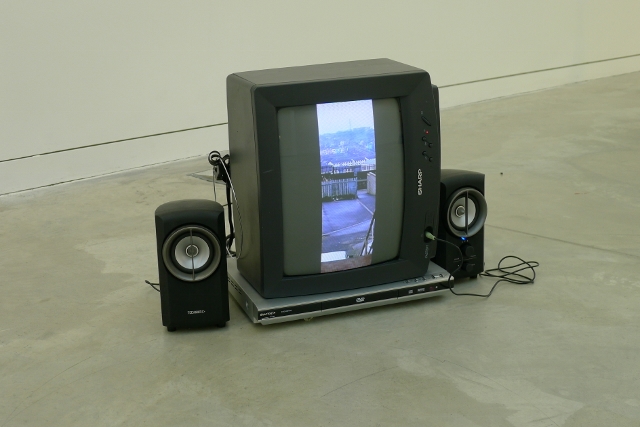
Of Note (2001) variable dimensions. Upturned TV, DVD
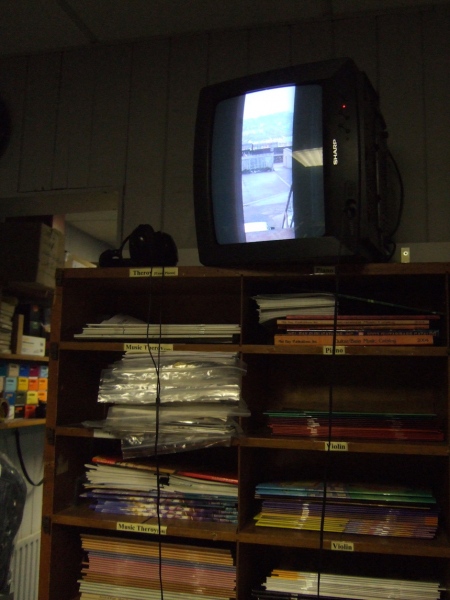
Of Note (2001) variable dimensions. Upturned TV, DVD (view Hendersons Music, Derry)
‘…Morris’s current studio is located within Derry’s inner walled city, above a musical instruments shop. In 2001 he made ‘Of Note’ a twelve minute looped video-work taken by a camera directed out from his studio rear door and overlooking the, by now classic, view of the Bogside area of he city. Given the heavy and sophisticated surveillance equipment stationed on the walls, it is clear that the artist has produced an ironic ‘take' on the official viewing of the area. What is also evident is that there is nothing of note to record - a woman passes by, it rains, an external air conditioning unit kicks in to operation. The footage is banal and boring now that the drama of the Bogside has been apparently played out. Its banality is further reinforced by the accompanying monotonous sound track, inspired by the regular piano tuning sessions sounding up from the music shop below, which also contributed to the artwork’s layered title ‘Of Note’. There is also a kind of comic resistance in the mimicry of the work, if not menace…’
(text extract Art and the Disembodied Eye, Liam Kelly, Golden Thread Gallery 2007)
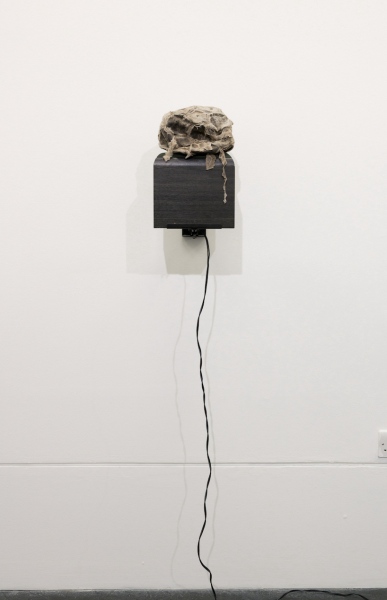
Up to a hundred (2000)
400 x 230 x 300mm. Found object (football) hi-fi speaker, speaker bracket, audio (16 min loop)
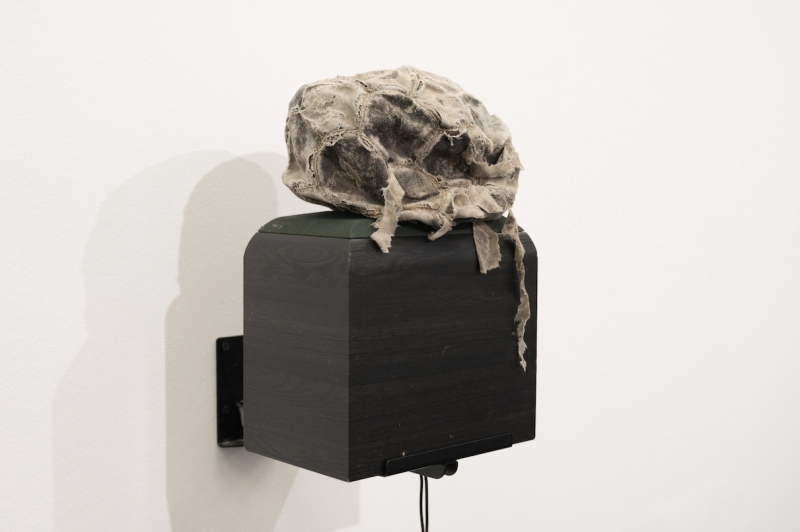
Up to a hundred (2000)
400 x 230 x 300mm. Found object (football) hi-fi speaker, speaker bracket, audio (16 min loop)
‘...in the changed political climate of the past few years its hardly surprising that the combative critique of ‘normalisation’ in Morris’s work should give way to the more light-hearted theatricalisation of ‘normality’ evident in the three pieces (all of 2000) which made up the ‘The Work Of a Dog’...’ The
third work in the show, Up to a Hundred, was a busted football perched on a speaker which relayed an 16-min audio loop of the artist struggling to keep the ball in the air. The sad but familiar tale of unrealised adolescent dreams and thwarted prowess takes on particularly poignant undertones in a community in which many teenagers of Morris’s generation felt compelled to ‘put away such childish things’ at an unconscionably early age in order to take up arms...’ ( text extract from Small Steps, Caoimhin Mac Giolla Leith, Catalogue 2001)
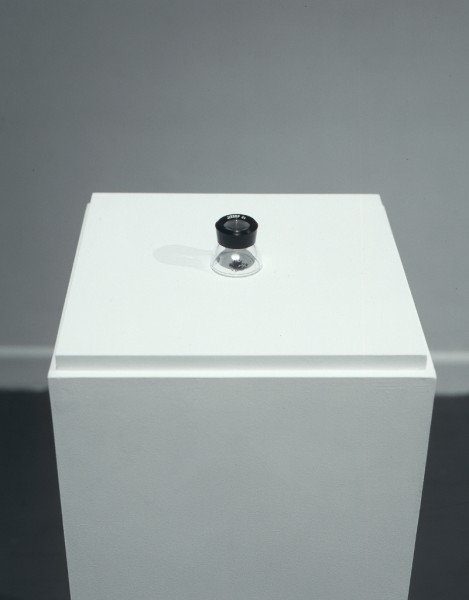
Itch (1999) 88 x 34 x 34 cm. Magnifier Lupe 8x, scrapings from a lottery scratch card, plinth
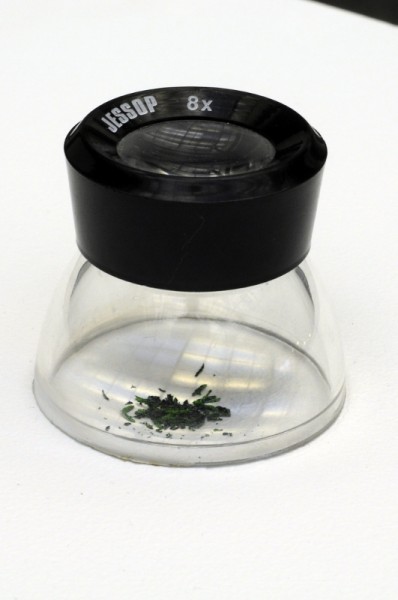
Itch (1999) (detail) 88 x 34 x 34 cm. Magnifier Lupe 8x, scrapings from a lottery scratch card, plinth
'...in Itch a small magnifying eye glass, of the type used to examine photographic negatives in detail, rests on a white plinth. A squint at what nestles under its tiny dome reveals the silver scrapings of a lottery scratch card: a wondrous, crystalline mountainscape in miniature. The displayed detritus of a failed (and decidedly non-transcendental) wager offers us as if by way of compensation, a window onto the lilliputian sublime...' ( text extract from Small Steps, Caoimhin Mac Giolla Leith, Catalogue 2001)
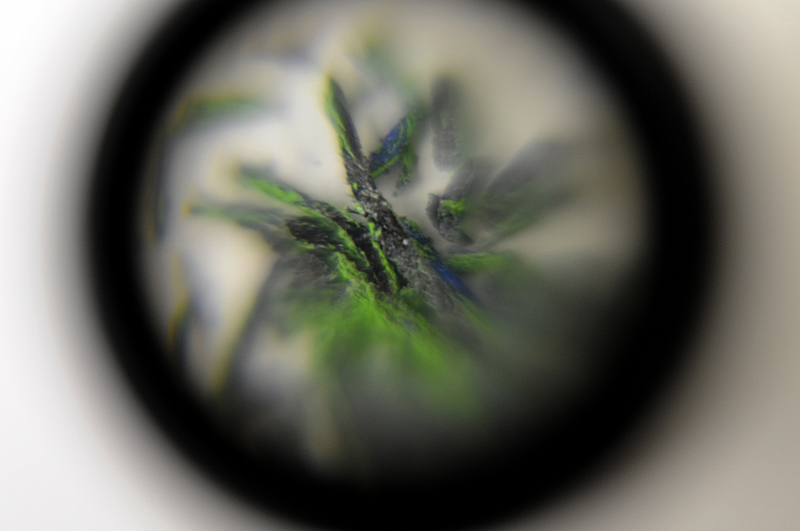
Itch (1999) (detail) 88 x 34 x 34 cm. Magnifier Lupe 8x, scrapings from a lottery scratch card, plinth
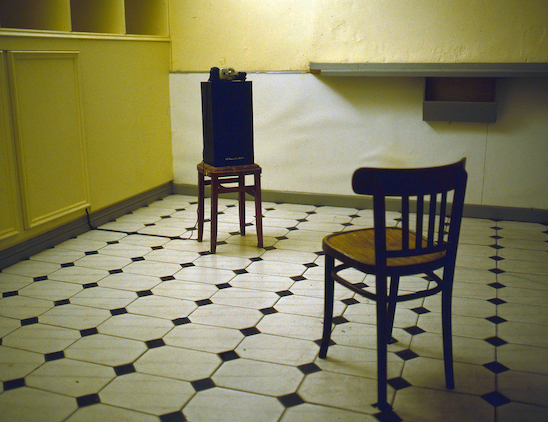
Past Conversation (1997) variable dimensions. Found objects (chair, stool) speaker, headphones, hardware, audio (Installation in former bookmakers, Chamberlain Street, Derry)
Past Conversation (1997) sound extract
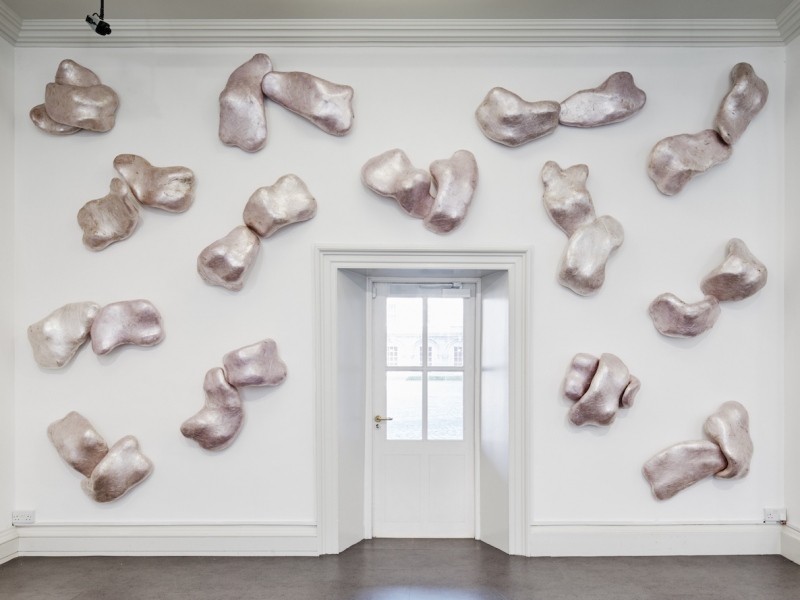
Comm (1992) variable dimensions. Toilet paper Papier mache, cling film, ink, sealed with flame. Collection Irish Museum of Modern Art
'...The third work in our series looking at the theme of solitude, isolation and communication is Locky Morris’s 1992 work Comm, a new addition to the IMMA Collection. The title refers to the term ‘comm’, which is a prisoner’s letter written in tiny lettering on either toilet paper or cigarette papers. Wrapped, and often heat-sealed in cling film, it is concealed in the mouth or other body orifices and smuggled in and out of jail, sometimes through a kiss.
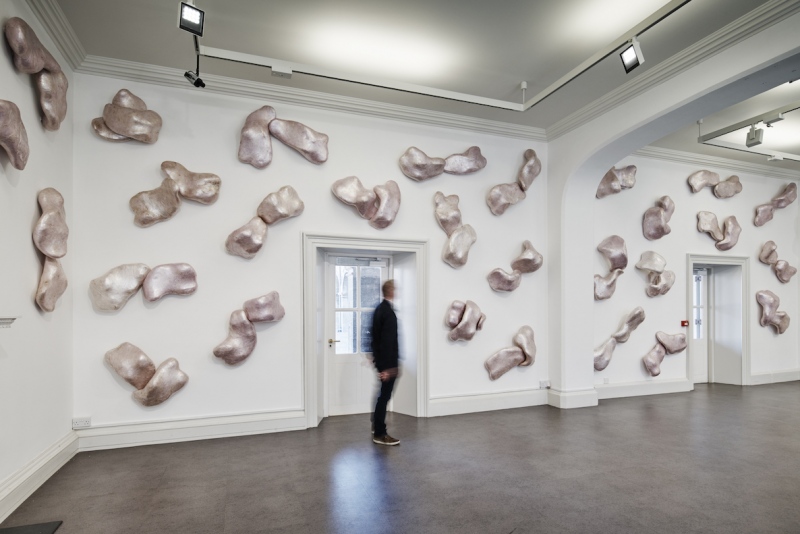
Comm (1992) variable dimensions. Toilet paper Papier mache, cling film, ink, sealed with flame. Collection Irish Museum of Modern Art
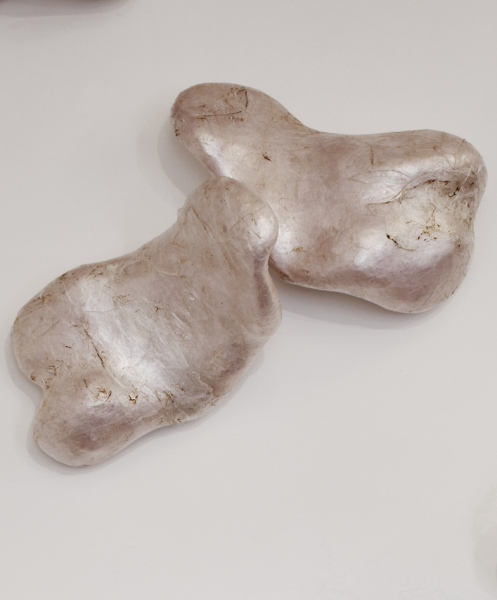
Comm (1992) (detail) variable dimensions. Toilet paper Papier mache, cling film, ink, sealed with flame. Collection Irish Museum of Modern Art
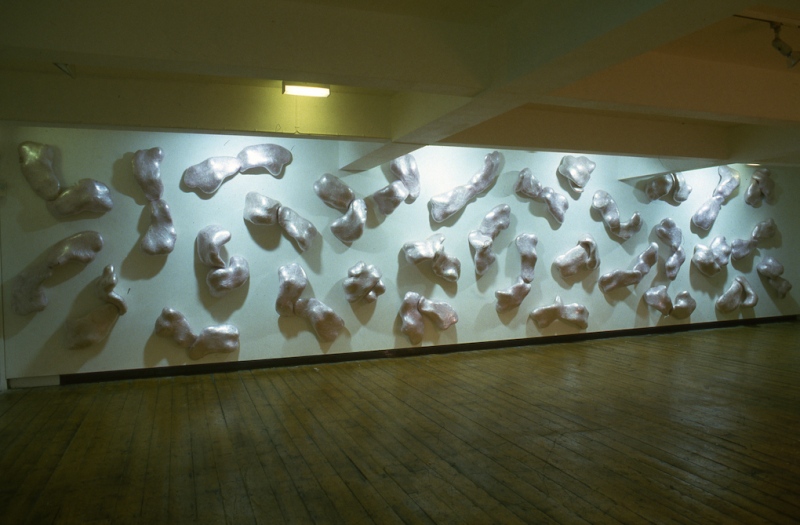
Comm (1992) variable dimensions. Toilet paper Papier mache, cling film, ink, sealed with flame. Collection Irish Museum of Modern Art (view Cornerhouse Manchester 1992)
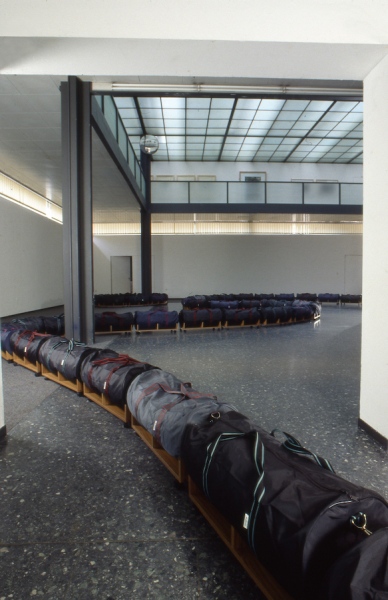
Aristocrat (1991) gallery installation. Large holdall bags (polyester/nylon) teak veneered chipboard, furniture latches, furniture castors (installation view, Mannheimer Kunstverein, Germany)

Aristocrat (1991) gallery installation. Large holdall bags (polyester/nylon), teak veneered chipboard, furniture latches, furniture castors (installation view, Mannheimer Kunstverein, Germany)
'...In 1991 Morris was invited to make an artwork at the Mannheim Kunstverein in Germany. The space was large reminding him of an airport lounge. It was also not long after the Berlin wall had come down and there was free movement of people from the former east Germany section. Indeed in the new Europe, as an economic block, cheap labour would be on the move with more urgency. And Mannheim itself was the centre of strategic military planning during the Gulf War. Even the scale and quantity of heavy articulated lorries on the German Autobahns seem to the artist to reinforce the tension in the air.
In response to the above factors and the scale and ambience of the gallery space Morris made a floor piece called Aristocrat. Like Cortege this installation snaked its way around two rooms. The work consisted of a series of cheap travelling bags (Aristocrat being their trade name) placed on wooden bases with wheels. It marks an important transition for the artist: increased scale; more minimalist in expression but not in concept and less representational in appearance. It was an experimental extension of means...'
(text extract, The City as Art, Liam Kelly, A.I.C.A , Irish section, 1994)
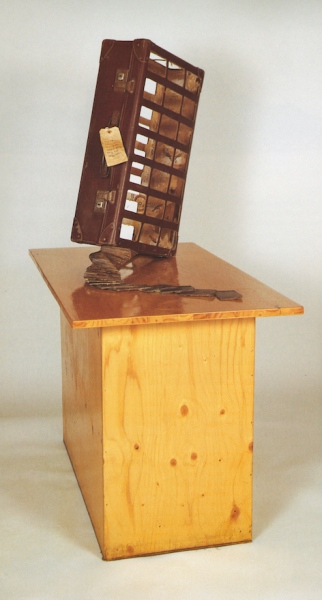
Twist (1989) 1300 x 560 x 980 mm. Suitcase, wood, bolts, lock, varnish, ink. Collection Belfast Media Group
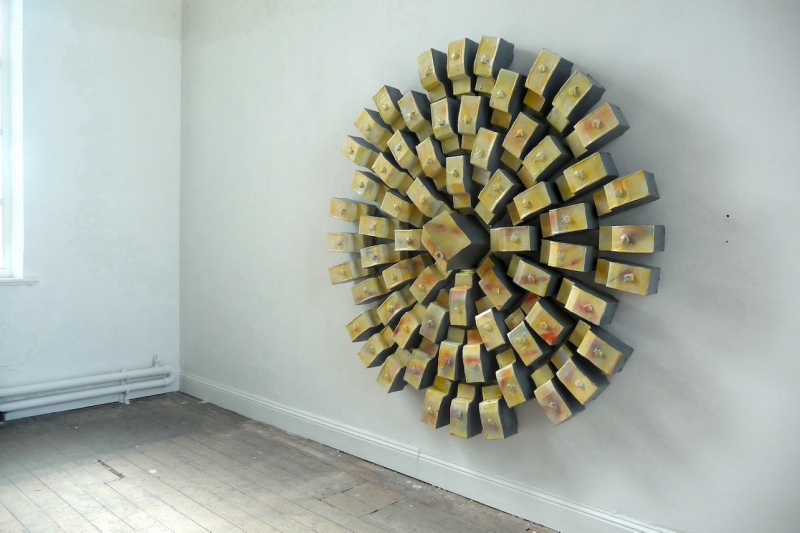
Dawn Raid (1988) 195 x 195 x 16cm. Cardboard, masking tape, household gloss paint. Collection Arts Council of Ireland
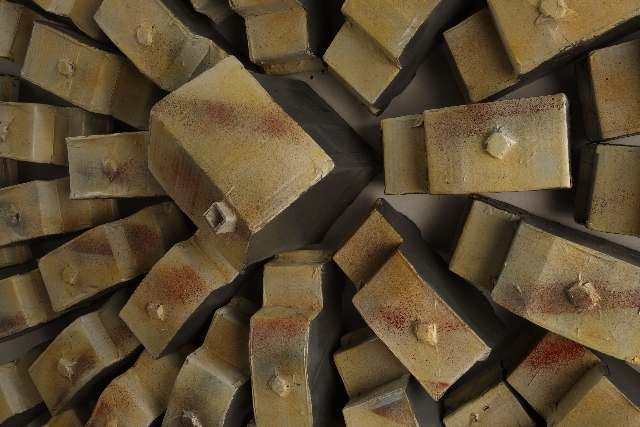
Dawn Raid (detail) (1988) 195 x 195 x 16cm. Cardboard, masking tape, household gloss paint. Collection Arts Council of Ireland.
'...Of course, the most common military unit of defence/resistance was the police grey landrover as it toured the cities of towns and streets in the province. In a densely packed circulating group as in Dawn Raid these police vehicles surround a house and take on a menacing power of address. The exaggeration given to this formal display of state power by the artist however, is both serious and humorous. But a sledgehammer cracking a nut is still a sledgehammer…Works like these made of the simplest materials such as cardboard, masking tape and paint, which adds to their sense of the ridiculous, explore the complexities of meanings and counter-meanings in the local situation. But at the same time their economy of means carries a charge of recognition beyond the local resonances...'
(text extract, The City as Art, Liam Kelly, A.I.C.A , Irish section, 1994)
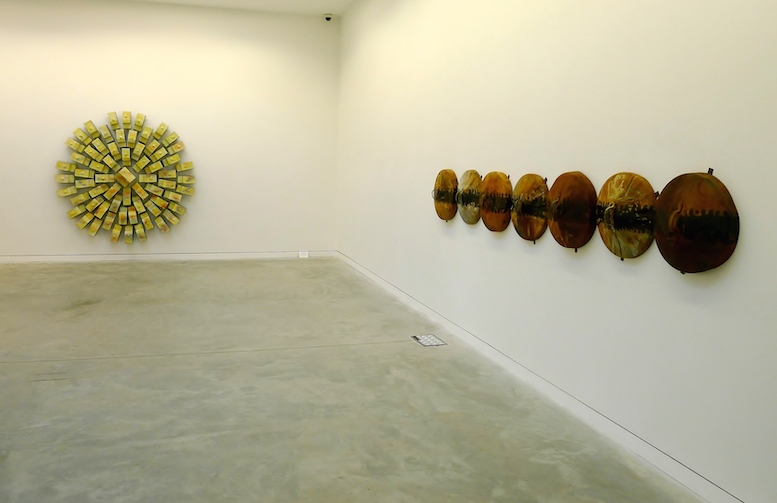
Dawn Raid (1988) Gap of Danger - An Bhearna Bhaoil (1988) Install RCC, Donegal 2010
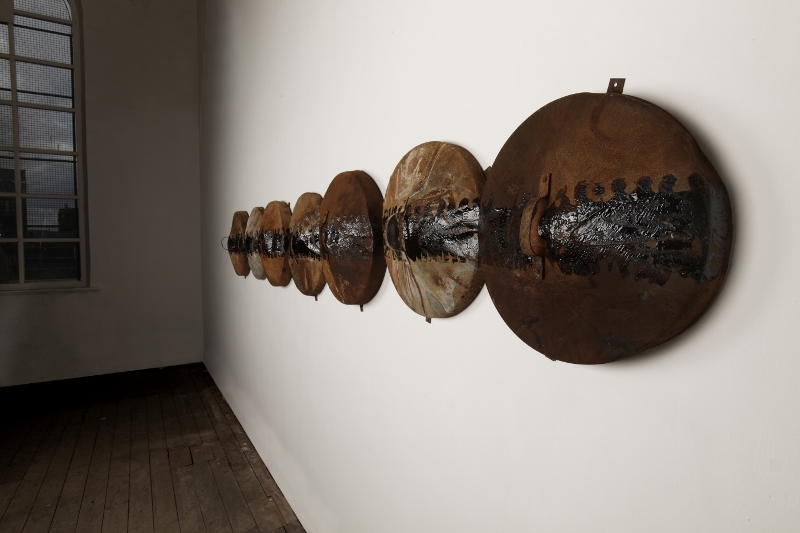
Gap of Danger - An Bhearna Bhaoil (1988) 56 x 14 x 450 cm. Burnt binlids, tar. Collection Wolverhampton Art Gallery and Museum
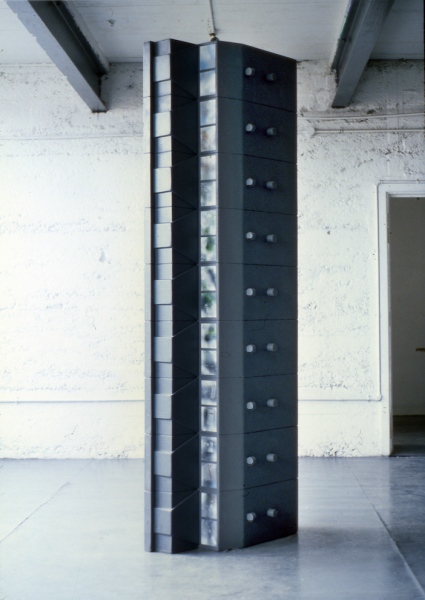
File (1988) 244 x 78 x 42 cm. Wood, paint.
‘…Morris, too, has considered the way a systems approach is taken in army intelligence work. Works such as File and Woman of Interest are about the depersonalisation of individuals, despite building up a factual databank on them, and the distorted profile that might follow…’
(text extract, The City as Art, Liam Kelly, A.I.C.A , Irish section, 1994)
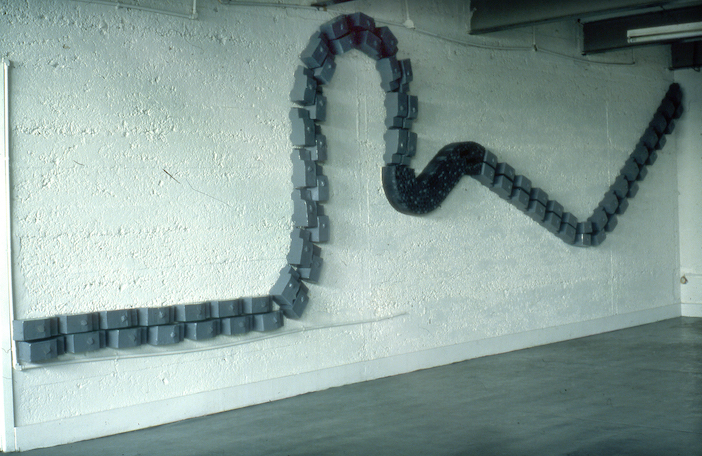
Cortege (1988) variable dimensions. Cardboard, masking tape, household gloss paint.
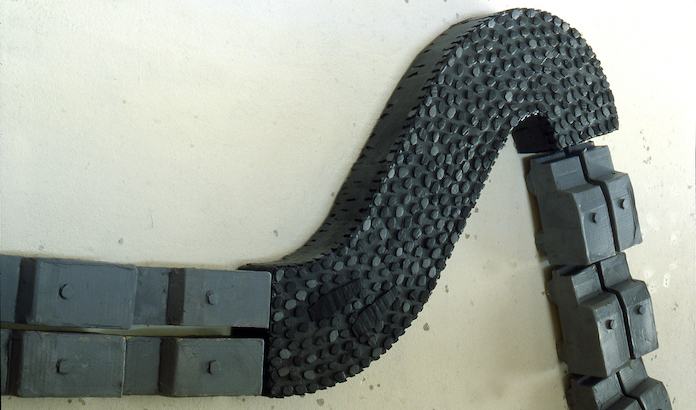
Cortege (detail) (1988) variable dimensions. Cardboard, masking tape, household gloss paint.
'...Of course, the most common military unit of defence/resistance was the police grey landrover as it toured the cities of towns and streets in the province…In Cortege the unit or (cell) works like a biological organism’s defence mechanism going into action. Here an IRA funeral cortege is militarily chaperoned front and ear along a twisting roadway. Works like these made of the simplest materials such as cardboard, masking tape and paint, which adds to their sense of the ridiculous, explore the complexities of meanings and counter-meanings in the local situation. But at the same time their economy of means carries a charge of recognition beyond the local resonances...'
(text extract, The City as Art, Liam Kelly, A.I.C.A , Irish section, 1994)
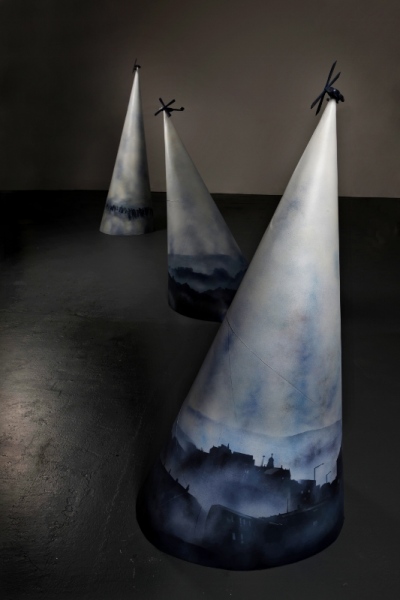
Town, Country and People (1985-86) variable dimensions. Mixed Media (including cardboard, masking tape, auto paint, body filler, wood and screws) Collection Ulster Museum
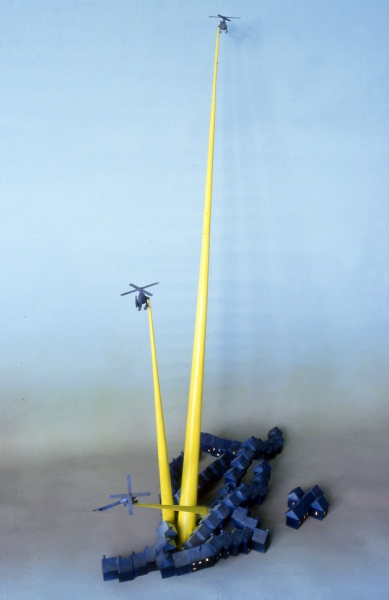
Creggan Nightlife (1984) 170 x 75 x 60cm. Mixed Media (including wood, brown paper gummed tape, auto paint, ice lolly sticks, drawing pins, matches, pencils, glue)
…Locky Morris’ early works were about surveillance in his native city of Derry. He went on to explore in subsequent sculptural works related and contentious issues such as confrontation, suppression, containment and the control and political engineering of movement and presence. Creggan Nightlife (1984) and Town, Country and People (1986) both objectify the routine experience of military surveillance by helicopters which daily hovered over ‘active’ sections of a town such as Derry. Creggan Nightlife was made just after college and is more a modelling of the experience, more an illustration of the event. On the other hand Town, Country and People is more resolved and self sufficient both as an object and an encapsulation of this aerial drama, sucking up the town’s portable secrets…’
(text extract, The City as Art, Liam Kelly, A.I.C.A , Irish section, 1994)
-
1
Re_sett_ing_s, JAKI IRVINE & LOCKY MORRIS 2023. Void Gallery Derry. Photo Simon Mills
-
2
Red Cs,
Locky Morris
2023.
Photograph
-
3
Re_sett_ing_s, JAKI IRVINE & LOCKY MORRIS 2022. Complex Gallery Dublin. Photo Kate-Bowe O' Brien
-
4
Re_sett_ing_s, JAKI IRVINE & LOCKY MORRIS 2022. Complex Gallery Dublin. Photo Kate-Bowe O' Brien
-
5
Selfie,
Locky Morris
2022
Photograph
-
6
Outside Job, (2021)LED Digital Billboard. Billboard Project, Void Offsites, April 2021
-
7
No. 8, (2021) Billboard Project, Void Offsites, Photo by Harry Kerr, courtesy of Void Gallery
-
8
Peel back,
Locky Morris
2021
Photograph
-
9
Floaters,
Locky Morris
2021
Photograph
-
10
nothing (but windows) (2021) Janie Doherty, Locky Morris Commissioned by Centre for Contemporary Art, Derry
-
11
nothing (but windows) (2021) video still. Janie Doherty, Locky Morris. Centre for Contemporary Art, Derry.
-
12
Locky Morris (2019) Install image. La tête disparaît/stairlift emoji
-
13
La tête disparaît (2019)
1300 x 1650 x 100mm. LED lightbox, Duratran. Collection National Gallery of Ireland
-
14
Windowcomplaint,
Locky Morris
2019.
Photograph
-
15
Fourbytwos,
Locky Morris
2019.
Photograph
-
16
Vhs'
Locky Morris
2018,
Photograph
-
17
Manys an afternoon,
Locky Morris
2018,
Photograph
-
18
Studio curtain (2018) 812 x 1320mm.
C-type print.
-
19
Stairlift emoji (2017) (installation image
"The Effects of Crossings & Self-Aggrandization in the Human Kingdom" Mario Mauroner Contemporary Art Vienna 2020
variable dimensions.
Artist mounted photograph on plasterboard, plate-stand, bulkhead light, cable.
'... The Irish artist sets out with his camera or smartphone in order to record found situations, momentary sculptures, and readymades from everyday life. Yet that is just one part of his work, which can boast a rich array of videos, installations and three-dimensional works.
His small installation Stairlift Emoji from 2017 shows the impression left by the mountings for a stairlift in his mothers house. She succumbed to dementia and as the stairlift was removed a kind of Smiley could be seen on the stair carpet. It is above all these small things, which normally go unnoticed, that interest the artist. Things that can have an appreciable effect in day-to-day life, whether as a commentary on a specific occurrence or quite simply as an impulse that stretches our minds in new directions...' (text extract from Be Seeing You, Martin Stather, Mannheimer Kunstverein, Catalogue 2020)
-
20
It’s you it’s you it’s you (2017) variable dimensions (image 500 x 500 x 70mm)
C-type print mounted on 18mm ply, sleep therapy pillow speakers, self-adhesive plastic hook (white) Audio
'...In another such interactive work a pair of small sleep therapy pillow speakers play a rendition recorded on a mobile phone of an Irish country easy listening song made famous by Joe Dolan; It's You It's You, It’s You, (the title of the work). Wires belonging to the speakers hang over a self-adhesive plastic hook attached to a photograph depicting an image of a tray with uneaten pancake and a glass of tea belonging to two small neatly clad feet in black shoes protruding from the far edge...'
(text extract from Especiallyeverything: the practices of Locky Morris, Anne Tallentire, Once a day every day all day long, Locky Morris 2019)
-
21
Tyre Fire (2017) 2100mm x 1550mm. LED lightbox, Duratran transparency
'Morris became known for his early sculptural work, which commented on “The Troubles” in Northern Ireland in the 1980’s. At the time, much of his work repurposed everyday objects and materials to create narratives about the negative effects of sectarian violence and government security measures on peoples lives.
Subsequently his work has become more personal and idiosyncratic. Often he begins with photography, which then gets incorporated into sculptural installations where objects formally or symbolically relate to the photograph(s) in associative ways. Connections are not always obvious, but rather cryptic puzzles are created for the viewer to solve.
Morris’s works poetically trigger the imagination rather than providing specific interpretation. There is a mischievousness in his strategy, as Morris imbues everyday and mundane images and objects with mysterious or portentous meaning. Manipulating materials in surprising ways, he produces objects that at first seem ordinary but gain importance as complex narratives unfold to the viewer.
The large Duratran image in this installation was recently shot in Derry, Northern Ireland, early in the morning while taking his children to school. On learning that he would be exhibiting at 1414 Monterey Street in a room with a fireplace, Morris remembered the image of the scorched corrugated iron wall in Derry. In the current political climate, this wall in Derry is redolent of the proposed wall along the Mexican/United States border, and similar divisive structures in other parts of the world' (wall text, Mattress Factory Museum, Pittsburgh 2017, ‘So it is’ curated by John Carson)
-
22
Tyre Fire (2017) 2100mm x 1550mm. LED lightbox, Duratran transparency, P, (2017) Photograph, glass block frame (2017) 152.4 x 101.6 x 25.4 mm (view Mattress Factory Art Museum, Pittsburgh USA)
-
23
Opening Act (2016) 980 x 180 x 460mm.
C-type print, artists’ keyboard flight case, readymade frame
'...Dissolving boundaries between convention and experimentation extends to titles and captions that with rhetorical flourish draw further meaning. Opening Act (2016), a photograph in a readymade frame resting on top of a keyboard flight case suggests the beginning and end of performance narrative continually on the move;...' (text extract from Especiallyeverything: the practices of Locky Morris, Anne Tallentire, Once a day every day all day long, Locky Morris 2019)
-
24
Michelangelo’s House (2013) 300 x 300 x 1200mm.
Painted MDF pedestal display case, rotating photo cube, C-type prints
-
25
Michelangelo’s House (2013) 300 x 300 x 1200mm.
Painted MDF pedestal display case, rotating photo cube, C-type prints
-
26
First Thing (2012)
variable dimensions. A4 mounted photograph, plate stand, 5 litre £stretcher utility box, spool of thread, plastic strips for wall plugs, wall plugs, cable ties, small plate stand, 4 gang extension lead, night light (mini plug-in), cotton buds, acrylic paint tube, connector strips, decorating clips
-
27
On High (2011) (detail) 30.3 x 53.6 x 6 cm. Lambda print on aluminium plate, pigmy light
-
28
On High (2011) (detail) 30.3 x 53.6 x 6 cm. Lambda print on aluminium plate, pigmy light
-
29
Day of the Rat (2010) 1800 x 1200 x 40mm.
Ultra slim LED lightbox, Duratran
'...In Day of the Rat, a photographic image presents the view through the blinds of a window, overlooking an imposing concrete bunker. At a formal level, one notes the voyeuristic arrangement of the scene, the artist's gaze from the periphery, from the inside of the house, onto the landscape. The anecdotal subtext adds another layer, however, re-visiting the political history of Northern Ireland from a contemporary, post-Troubles perspective. Morris had been asked to sort out a dead rat, decomposing underneath the floorboards of his mother's house. Having called in professional exterminators, who were engaged in cutting holes in the floor while trying to 'sniff out' the corpse, the artist and his family retreated to the upstairs bedroom. Here, his eye was caught by the glare of sunlight through the window and a glimpse through the shutters of a cemetery outside. For Morris, the building's stark exterior, brutalist architecture and nearby floodlights recalled a prison camp and it is this (un) intentional misreading that can be seen to bridge the two divides of his practice. The correspondence between cemetery and floorboards, the artist sequestered in his mother's bedroom while 'interpreting' the building as a prison, the uncanny charge of the past rushing into the present; through these accidents, one infers the legacy of the Troubles. It is Morris' attunement to such connections, and his ability to re-assemble and re-create that experience, that offers another, subtler reading. It is this anecdote that resists the overall, objective meaning and that states, without apology: “I guess you had to be there.” (text extract ‘Practicing everyday life’ Chris Clarke, This Then, Locky Morris, Catalogue 2010 )
-
30
Day of the Rat (2010) 1800 x 1200 x 40mm.
Ultra slim LED lightbox, Duratran
-
31
The Drop 2007 (reconfigured 2016) variable dimensions.
Mounted photographs, shorty tilt display stand, Smartlamp, hand cleanser dispenser, sunglasses, workshop broom
-
32
The Drop (detail) (2007 reconfigured 2016) variable dimensions.
Mounted photographs, shorty tilt display stand, Smartlamp, hand cleanser dispenser, sunglasses, workshop broom
'...Locky Morris’s The Drop tells a story, but it also makes us act out a sort of double-take, running between the different parts of the installation to piece together and relive the moment when – plop/click – the glasses disappeared into that trough of filth, and the camera simultaneously captured the scene. It’s an impossible, comic moment, but also one where you shake your head and think, ‘Isn’t it always the way?’. Like most of Morris’s work, The Drop springs from photography to entangle us in that brief incident. He explores the mundane, and picks at the seemingly insignificant to bring out the humour and the deeper paradoxes in those moments, the forgotten fascinating corners in the day’s repetitive chores...'
(text extract from Ridiculous Beginnings, Chris Fite-Wassilak for Stop lookin' at Photographs!, Locky Morris, Naughton Gallery, Belfast (2017)
-
33
The Drop (detail) (2007) reconfigured 2016) variable dimensions.
Mounted photographs, shorty tilt display stand, Smartlamp, hand cleanser dispenser, sunglasses, workshop broom
-
34
Downtime (2011) 253 x 253mm.
C-type print
-
35
From Day One (2008) variable dimensions, approx. 63.5 x 63.5 x 68 cm. illuminated glass display case, carpet, crumpled card (child's shirt collar insert)
-
36
From Day One (detail) (2008) variable dimensions, approx. 63.5 x 63.5 x 68 cm. illuminated glass display case, carpet, crumpled card (child's shirt collar insert)
'...In Morris' recent works, it seems as if he is trying to establish the border between humanity and the appearance of humanity. To record the act of living, of seeing, of hearing, and being in the world. As in 'From Day One', where Morris installs a square section of his bedroom carpet into a glass vitrine, onto which his daughter, in the chaos and excitement of her first day at school, has tossed a tiny cardboard collar support. It is a moment of uncoiled human promise captured along with the priceless visualisation of a bedroom missing
some carpet. And all this happens under the dullest of precincts, the fluorescent glare of a bulb - the last place one would stumble upon an act of paternal love...' (text extract John M. Cunningham, This then, Locky Morris. Catalogue 2010)
-
37
White Dog And Seat (2010) variable dimensions. C-type print
-
38
White Dog And Seat (2010) variable dimensions. C-type print (view Ex Elettrofonica, Rome, 2015)
-
39
Windowsill (2008) (detail) variable dimensions. Duratrans, lightboxes.
-
40
Acid Free (2007-2009) (detail) variable dimensions. Empty Rennie packaging (antacid medication) 35mm slide trays, wall lights, improvised brackets.
-
41
Acid Free (2007-2009) (detail) variable dimensions. Empty Rennie packaging (antacid medication) 35mm slide trays, wall lights, improvised brackets.
'... Similarly, in Acid Free, hundreds of tiny plastic packets of Morris' habitually taken anti-acid medication are assembled with the formal rigour, elegance and new-found dignity of a Dan Flavin installation...' (text extract From Day One, Locky Morris, mother's tankstation, Dublin 2010)
-
42
Stairpile (2008) variable dimensions. C-type print
'...With evident delight and humour Morris magnifies seemingly insignificant details of everyday life, piles of washing, cups of tea, chewed pencils - daily epiphanies, as he describes them - until they acquire the complexites and emotional profundity of an operatic aria. We laugh and cry at them and with them in equal measure. When the artist's intention reveals itself to the viewer - and it often tends to do so in a slow and deliberate manner...' (text extract From Day One, Locky Morris, mother's tankstation, Dublin 2010)
-
43
Frozen Export (2009-10) (detail) 24.5 x 38.1 cm. C-type prints
-
44
Frozen Export (2009-10) each 24.5 x 38.1 cm. 9 C-type prints
-
45
This Building (2010) variable dimensions (approx 50 x 150 x 145 cm) Upright piano elements, LP, framed photograph, powered speakers, CDR (looped audio)
-
46
This Building (detail - Vinyl LP) (2010) variable dimensions (approx 50 x 150 x 145 cm) Upright piano elements, LP, framed photograph, powered speakers, CDR (looped audio)
-
47
This Building (detail - framed photograph) (2010) variable dimensions (approx 50 x 150 x 145 cm) Upright piano elements, LP, framed photograph, powered speakers, CDR (looped audio)
-
48
The Last (2010) 124 x 95 x 120mm. Laser crystal photo frame, foam lining, adapted shelf
-
49
Bathroom Suite (2010) 164cmx153cmx18cm (variable) Adapted cubed shelving, linkable triphoshor flourescent fittings, ceiling speakers, audio. '...In Bathroom Suite, two discretely minimal speakers, reminiscent of fixtures in the artist's lavatory, play a composition based on Morris' morning routine. Constructed from recordings of the artist brushing his teeth, shaving, and pottering around the bathroom, the work is accelerated, distorted, mashed-up, spliced and compressed into a minute-long collage. Morris' fascination with found sounds is an extension of the artistic sensitivity to visual occurrences demonstrated in From Day One, yet also reveals his abiding interest in the transmission of such experiences.The tendency to conflate different periods of time and to render the initial source unrecognisable exemplifies the awareness that one cannot simply re-create that moment in its entirety, and that, in communicating the instant, it tends to become garbled, misheard, and incompletely represented...' (text extract ‘Practicing everyday life’ Chris Clarke, This Then, Locky Morris, Catalogue 2010 )
-
50
Bathroom Suite (2010) sound extract
-
51
Locky Morris
Teabreakdowns (2007 reconfigured 2016) (detail)
Printed mug, clock radio speaker, metal stand, A4 show-cards, artists’ studio table, audio loop
-
52
Home Entertainment (2006) variable dimensions. Sound activated disco lights, portable stereo, CDR (audio)
-
53
Of Note (2001) variable dimensions. Upturned TV, DVD
-
54
Of Note (2001) variable dimensions. Upturned TV, DVD (view Hendersons Music, Derry)
‘…Morris’s current studio is located within Derry’s inner walled city, above a musical instruments shop. In 2001 he made ‘Of Note’ a twelve minute looped video-work taken by a camera directed out from his studio rear door and overlooking the, by now classic, view of the Bogside area of he city. Given the heavy and sophisticated surveillance equipment stationed on the walls, it is clear that the artist has produced an ironic ‘take' on the official viewing of the area. What is also evident is that there is nothing of note to record - a woman passes by, it rains, an external air conditioning unit kicks in to operation. The footage is banal and boring now that the drama of the Bogside has been apparently played out. Its banality is further reinforced by the accompanying monotonous sound track, inspired by the regular piano tuning sessions sounding up from the music shop below, which also contributed to the artwork’s layered title ‘Of Note’. There is also a kind of comic resistance in the mimicry of the work, if not menace…’
(text extract Art and the Disembodied Eye, Liam Kelly, Golden Thread Gallery 2007)
-
55
Up to a hundred (2000)
400 x 230 x 300mm. Found object (football) hi-fi speaker, speaker bracket, audio (16 min loop)
-
56
Up to a hundred (2000)
400 x 230 x 300mm. Found object (football) hi-fi speaker, speaker bracket, audio (16 min loop)
‘...in the changed political climate of the past few years its hardly surprising that the combative critique of ‘normalisation’ in Morris’s work should give way to the more light-hearted theatricalisation of ‘normality’ evident in the three pieces (all of 2000) which made up the ‘The Work Of a Dog’...’ The
third work in the show, Up to a Hundred, was a busted football perched on a speaker which relayed an 16-min audio loop of the artist struggling to keep the ball in the air. The sad but familiar tale of unrealised adolescent dreams and thwarted prowess takes on particularly poignant undertones in a community in which many teenagers of Morris’s generation felt compelled to ‘put away such childish things’ at an unconscionably early age in order to take up arms...’ ( text extract from Small Steps, Caoimhin Mac Giolla Leith, Catalogue 2001)
-
57
Itch (1999) 88 x 34 x 34 cm. Magnifier Lupe 8x, scrapings from a lottery scratch card, plinth
-
58
Itch (1999) (detail) 88 x 34 x 34 cm. Magnifier Lupe 8x, scrapings from a lottery scratch card, plinth
'...in Itch a small magnifying eye glass, of the type used to examine photographic negatives in detail, rests on a white plinth. A squint at what nestles under its tiny dome reveals the silver scrapings of a lottery scratch card: a wondrous, crystalline mountainscape in miniature. The displayed detritus of a failed (and decidedly non-transcendental) wager offers us as if by way of compensation, a window onto the lilliputian sublime...' ( text extract from Small Steps, Caoimhin Mac Giolla Leith, Catalogue 2001)
-
59
Itch (1999) (detail) 88 x 34 x 34 cm. Magnifier Lupe 8x, scrapings from a lottery scratch card, plinth
-
60
Past Conversation (1997) variable dimensions. Found objects (chair, stool) speaker, headphones, hardware, audio (Installation in former bookmakers, Chamberlain Street, Derry)
-
61
Past Conversation (1997) sound extract
-
62
Comm (1992) variable dimensions. Toilet paper Papier mache, cling film, ink, sealed with flame. Collection Irish Museum of Modern Art
'...The third work in our series looking at the theme of solitude, isolation and communication is Locky Morris’s 1992 work Comm, a new addition to the IMMA Collection. The title refers to the term ‘comm’, which is a prisoner’s letter written in tiny lettering on either toilet paper or cigarette papers. Wrapped, and often heat-sealed in cling film, it is concealed in the mouth or other body orifices and smuggled in and out of jail, sometimes through a kiss.
Morris’s sensual sculptural piece was the beginning of a number of works by the artist around that period that focused on comms and explored themes of suppression and censorship in the Republic of Ireland and Northern Ireland. It expands on concepts of clandestine forms of communication that subvert and bypass police control and electronic communication lines.Installation view at the 38th EVA International at IMMA -
63
Comm (1992) variable dimensions. Toilet paper Papier mache, cling film, ink, sealed with flame. Collection Irish Museum of Modern Art
-
64
Comm (1992) (detail) variable dimensions. Toilet paper Papier mache, cling film, ink, sealed with flame. Collection Irish Museum of Modern Art
-
65
Comm (1992) variable dimensions. Toilet paper Papier mache, cling film, ink, sealed with flame. Collection Irish Museum of Modern Art (view Cornerhouse Manchester 1992)
-
66
Aristocrat (1991) gallery installation. Large holdall bags (polyester/nylon) teak veneered chipboard, furniture latches, furniture castors (installation view, Mannheimer Kunstverein, Germany)
-
67
Aristocrat (1991) gallery installation. Large holdall bags (polyester/nylon), teak veneered chipboard, furniture latches, furniture castors (installation view, Mannheimer Kunstverein, Germany)
'...In 1991 Morris was invited to make an artwork at the Mannheim Kunstverein in Germany. The space was large reminding him of an airport lounge. It was also not long after the Berlin wall had come down and there was free movement of people from the former east Germany section. Indeed in the new Europe, as an economic block, cheap labour would be on the move with more urgency. And Mannheim itself was the centre of strategic military planning during the Gulf War. Even the scale and quantity of heavy articulated lorries on the German Autobahns seem to the artist to reinforce the tension in the air.
In response to the above factors and the scale and ambience of the gallery space Morris made a floor piece called Aristocrat. Like Cortege this installation snaked its way around two rooms. The work consisted of a series of cheap travelling bags (Aristocrat being their trade name) placed on wooden bases with wheels. It marks an important transition for the artist: increased scale; more minimalist in expression but not in concept and less representational in appearance. It was an experimental extension of means...'
(text extract, The City as Art, Liam Kelly, A.I.C.A , Irish section, 1994)
-
68
Twist (1989) 1300 x 560 x 980 mm. Suitcase, wood, bolts, lock, varnish, ink. Collection Belfast Media Group
-
69
Dawn Raid (1988) 195 x 195 x 16cm. Cardboard, masking tape, household gloss paint. Collection Arts Council of Ireland
-
70
Dawn Raid (detail) (1988) 195 x 195 x 16cm. Cardboard, masking tape, household gloss paint. Collection Arts Council of Ireland.
'...Of course, the most common military unit of defence/resistance was the police grey landrover as it toured the cities of towns and streets in the province. In a densely packed circulating group as in Dawn Raid these police vehicles surround a house and take on a menacing power of address. The exaggeration given to this formal display of state power by the artist however, is both serious and humorous. But a sledgehammer cracking a nut is still a sledgehammer…Works like these made of the simplest materials such as cardboard, masking tape and paint, which adds to their sense of the ridiculous, explore the complexities of meanings and counter-meanings in the local situation. But at the same time their economy of means carries a charge of recognition beyond the local resonances...'
(text extract, The City as Art, Liam Kelly, A.I.C.A , Irish section, 1994)
-
71
Dawn Raid (1988) Gap of Danger - An Bhearna Bhaoil (1988) Install RCC, Donegal 2010
-
72
Gap of Danger - An Bhearna Bhaoil (1988) 56 x 14 x 450 cm. Burnt binlids, tar. Collection Wolverhampton Art Gallery and Museum
-
73
File (1988) 244 x 78 x 42 cm. Wood, paint.
‘…Morris, too, has considered the way a systems approach is taken in army intelligence work. Works such as File and Woman of Interest are about the depersonalisation of individuals, despite building up a factual databank on them, and the distorted profile that might follow…’
(text extract, The City as Art, Liam Kelly, A.I.C.A , Irish section, 1994)
-
74
Cortege (1988) variable dimensions. Cardboard, masking tape, household gloss paint.
-
75
Cortege (detail) (1988) variable dimensions. Cardboard, masking tape, household gloss paint.
'...Of course, the most common military unit of defence/resistance was the police grey landrover as it toured the cities of towns and streets in the province…In Cortege the unit or (cell) works like a biological organism’s defence mechanism going into action. Here an IRA funeral cortege is militarily chaperoned front and ear along a twisting roadway. Works like these made of the simplest materials such as cardboard, masking tape and paint, which adds to their sense of the ridiculous, explore the complexities of meanings and counter-meanings in the local situation. But at the same time their economy of means carries a charge of recognition beyond the local resonances...'
(text extract, The City as Art, Liam Kelly, A.I.C.A , Irish section, 1994)
-
76
Town, Country and People (1985-86) variable dimensions. Mixed Media (including cardboard, masking tape, auto paint, body filler, wood and screws) Collection Ulster Museum
-
77
Creggan Nightlife (1984) 170 x 75 x 60cm. Mixed Media (including wood, brown paper gummed tape, auto paint, ice lolly sticks, drawing pins, matches, pencils, glue)
…Locky Morris’ early works were about surveillance in his native city of Derry. He went on to explore in subsequent sculptural works related and contentious issues such as confrontation, suppression, containment and the control and political engineering of movement and presence. Creggan Nightlife (1984) and Town, Country and People (1986) both objectify the routine experience of military surveillance by helicopters which daily hovered over ‘active’ sections of a town such as Derry. Creggan Nightlife was made just after college and is more a modelling of the experience, more an illustration of the event. On the other hand Town, Country and People is more resolved and self sufficient both as an object and an encapsulation of this aerial drama, sucking up the town’s portable secrets…’
(text extract, The City as Art, Liam Kelly, A.I.C.A , Irish section, 1994)
Selected works · click/tap on images for more info / scroll right and left
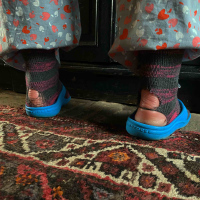
Locky Morris / heelies / Instagram post / 30 - 06 - 2021
Locky Morris / frozenscene1 / Instagram post / 09-01-2018
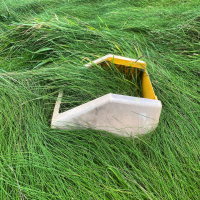
Locky Morris / alotofemphasis / Instagram post / 24 - 09 - 2023
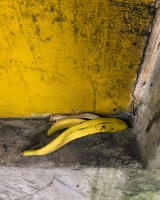
Locky Morris / carparkbanana / Instagram post / 20-11-2020
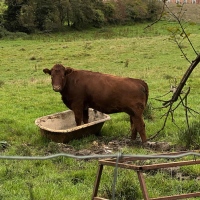
Locky Morris / hoofsoak / Instagram post / 08-10-2020
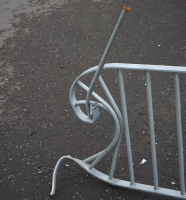
Locky Morris / Instagram post / 16-08-2022
Locky Morris / ducks-say-on / Instagram post / 26-08-2020
-
1
Locky Morris / heelies / Instagram post / 30 - 06 - 2021
-
2
Locky Morris / frozenscene1 / Instagram post / 09-01-2018
-
3
Locky Morris / alotofemphasis / Instagram post / 24 - 09 - 2023
-
4
Locky Morris / carparkbanana / Instagram post / 20-11-2020
-
5
Locky Morris / hoofsoak / Instagram post / 08-10-2020
-
6
Locky Morris / Instagram post / 16-08-2022
-
7
Locky Morris / ducks-say-on / Instagram post / 26-08-2020
-
8
Locky Morris / Instagram post / 09-07-2019
-
9
Locky Morris / #foylebridgehi / Instagram post / 22-02-2018
-
10
Locky Morris / Apprentice Boys Memorial Hall / Instagram post / 07 - 07 - 2018
-
11
Locky Morris / Instagram post / 14 - 09 - 2017
-
12
Locky Morris / immaculate conception / Instagram post / 14 - 03 - 2017
-
13
Locky Morris / tvdrama / Instagram post / 11-06-2018
-
14
Locky Morris / #foylebridgehi / Instagram post / 18-05-2018
-
15
Locky Morris / Instagram post / 14-05-2018
-
16
Locky Morris / lastminutegifttoken / Instagram post / 24-09-2017
-
17
Locky Morris / Ladders / Instagram post / 07-09-2017
-
18
Locky Morris / therenow#theverywalls / Instagram post / 23-04-2017
-
19
Locky Morris / floater(realtime) / Instagram post / 31-01-2017

Locky Morris / heelies / Instagram post / 30 - 06 - 2021
Locky Morris / frozenscene1 / Instagram post / 09-01-2018

Locky Morris / alotofemphasis / Instagram post / 24 - 09 - 2023

Locky Morris / carparkbanana / Instagram post / 20-11-2020

Locky Morris / hoofsoak / Instagram post / 08-10-2020

Locky Morris / Instagram post / 16-08-2022
Locky Morris / ducks-say-on / Instagram post / 26-08-2020

Locky Morris / Instagram post / 09-07-2019
Locky Morris / #foylebridgehi / Instagram post / 22-02-2018

Locky Morris / Apprentice Boys Memorial Hall / Instagram post / 07 - 07 - 2018
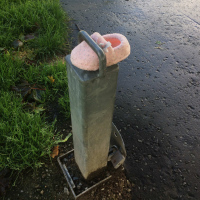
Locky Morris / Instagram post / 14 - 09 - 2017
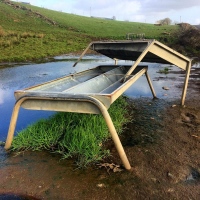
Locky Morris / immaculate conception / Instagram post / 14 - 03 - 2017
Locky Morris / tvdrama / Instagram post / 11-06-2018
Locky Morris / #foylebridgehi / Instagram post / 18-05-2018
Locky Morris / Instagram post / 14-05-2018
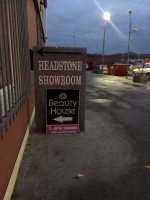
Locky Morris / lastminutegifttoken / Instagram post / 24-09-2017
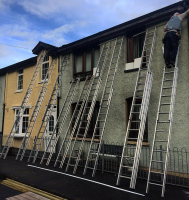
Locky Morris / Ladders / Instagram post / 07-09-2017
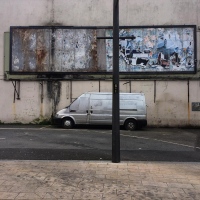
Locky Morris / therenow#theverywalls / Instagram post / 23-04-2017
Locky Morris / floater(realtime) / Instagram post / 31-01-2017
-
1
Locky Morris / heelies / Instagram post / 30 - 06 - 2021
-
2
Locky Morris / frozenscene1 / Instagram post / 09-01-2018
-
3
Locky Morris / alotofemphasis / Instagram post / 24 - 09 - 2023
-
4
Locky Morris / carparkbanana / Instagram post / 20-11-2020
-
5
Locky Morris / hoofsoak / Instagram post / 08-10-2020
-
6
Locky Morris / Instagram post / 16-08-2022
-
7
Locky Morris / ducks-say-on / Instagram post / 26-08-2020
-
8
Locky Morris / Instagram post / 09-07-2019
-
9
Locky Morris / #foylebridgehi / Instagram post / 22-02-2018
-
10
Locky Morris / Apprentice Boys Memorial Hall / Instagram post / 07 - 07 - 2018
-
11
Locky Morris / Instagram post / 14 - 09 - 2017
-
12
Locky Morris / immaculate conception / Instagram post / 14 - 03 - 2017
-
13
Locky Morris / tvdrama / Instagram post / 11-06-2018
-
14
Locky Morris / #foylebridgehi / Instagram post / 18-05-2018
-
15
Locky Morris / Instagram post / 14-05-2018
-
16
Locky Morris / lastminutegifttoken / Instagram post / 24-09-2017
-
17
Locky Morris / Ladders / Instagram post / 07-09-2017
-
18
Locky Morris / therenow#theverywalls / Instagram post / 23-04-2017
-
19
Locky Morris / floater(realtime) / Instagram post / 31-01-2017
Selected images and videos from instagram especiallyeverything → https://www.instagram.com/lockymorrisartist/
Especiallyeverything is the name Locky Morris has given his Instagram account. He has been posting almost every day for a few years now, images taken in all weathers; rain, ice, sun, cloud at day and at night. Two pink steel reinforcing bars align along the foot of a long grey wall, a large ball of sea foam bounces on the incoming tides, discarded VHS video tapes neatly stacked on top of a litter bin are surrounded by nettles, a plank balances across a car bonnet at one end and a bollard at the other, viridian green paint clashes with lime green moss, parked up on shards of red plasterboard a digger lurks behind a crimson fence, his young daughter breathes on a sheet of ice she is holding in front of her face, and a breeze catches a funnel of curtain by an open door.
In ‘The Practice of Everyday Life’, Michel de Certeau asserts that through routine tasks people adopt tactics to resist strategies of control associated with administration and power. Tactics according to de Certeau’s theory depend on time – always being on watch for opportunities. This is perhaps useful when thinking how the unexpected and unpredictable observations that inform Morris’s work give agency to the activities of his everyday. In his notation and exploration of what surprises, excites and puzzles him in and around his neighbourhood we encounter his practice...
(opening paragraphs from Especiallyeverything: the practices of Locky Morris, Anne Tallentire, Once a day every day all day long, Locky Morris 2019)